#what’s that you say? your narrative has tragedy and self destructive characters? I am at your house I am eating your soup
Text

Me, aimlessly scribbling
My brain, every time without fail: hey what if you drew Catra again remember when we used to draw Catra-
#who am i to deny it#catra fanart#spop catra#spop fanart#I don’t care if this fandom is dead this show came out when I was having my highschool queer heartbreak and it’s a mOMent in time for me ok#anyway slay love the girl fail of all time#what’s that you say? your narrative has tragedy and self destructive characters? I am at your house I am eating your soup#my art#artists on tumblr#art#digital art#illustration#artistsontumblr#catrafanart#catradora#catra shera#sheranetflix#shera and the princesses of power#oh? your antagonist/deuteragonist has abandonment issues and copes with it by pushing everyone away and pretending everything is fine?#can’t handle emotions? Catra is the he’s not used to positive feedback megamind meme#anyway I love
311 notes
·
View notes
Text
I adore the fact that in so many other stories, Mob Psycho would’ve concluded with the World Domination Arc. After all, it has the big, climatic battle with the ensemble cast versus the overarching villain. They win, and everyone goes home, all’s well that ends well, right?
Except the story doesn’t end there. Because Mob has yet to reckon with this internal, antagonist force that has haunted the narrative since the very beginning: Himself.
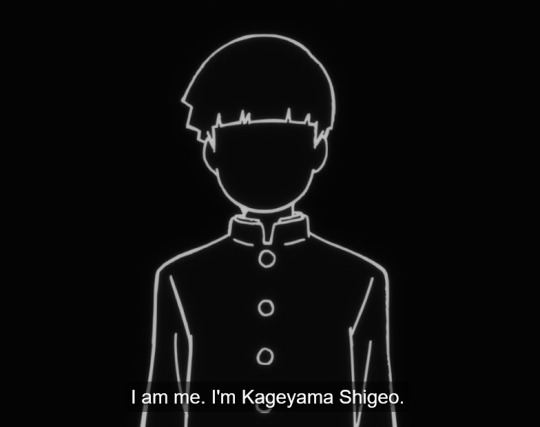
When Mob comes face-to-face with ???% at long last, he says: I am Kageyama Shigeo.
This isn’t a conflict with a villain, or another esper, or even a separate entity that resides inside Mob’s body. It is something far more personal, and far more relatable.
???% is the culmination of everything Mob’s held back. Not just emotions like anger or fear. Even his desires, like his crush on Tsubomi. All muted by his efforts not to hurt anybody with his powers. Mob has come such a long way, but he’s still restraining his feelings so tightly that the moment his control wavered, ???% took over.
But the conflict isn’t the destruction ???% is wreaking just by walking through the city. The conflict is Mob refusing to accept this part of himself he’s suppressed for so long.
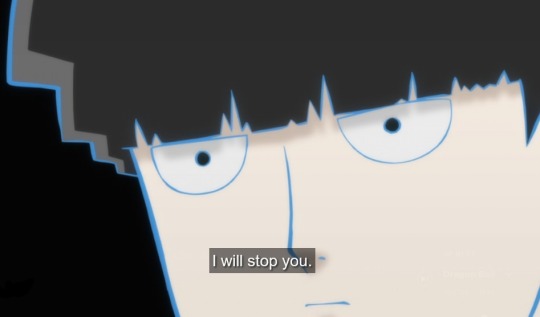
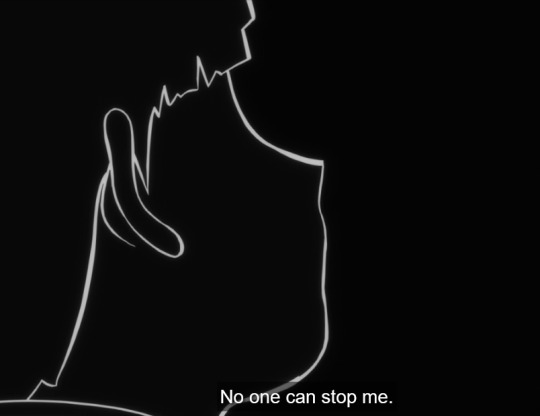
And ???% is right! Every attempt to stop him thus far has failed. Because he isn’t meant to be stopped. Mob has to reconcile with the parts of himself that he won’t acknowledge.
And it’s the most difficult thing Mob has ever had to do! This is the part of himself that hurt his brother; that hurt his friends and decimated so much of the city. Reconciling with it means accepting that Mob hurt those people, whether he wanted to or not. It means accepting all facets of himself, even ones he’s not proud of or wishes he could change but cannot.
Mob has grown so much in this latest season alone, he hasn’t had any explosions, and he felt confident enough in his own abilities to actually ask Tsubomi out, which was something the Mob of two seasons ago could never imagine.
But what about the advice Reigen gave him for his confession to Tsubomi?
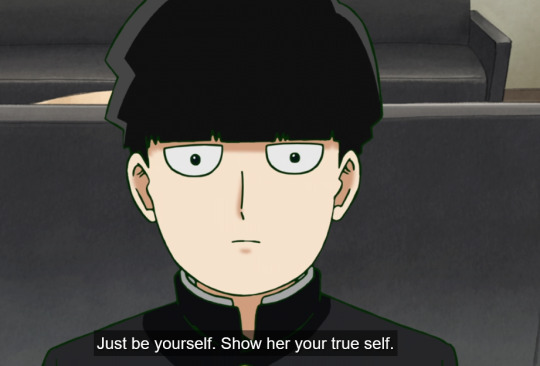
His true self, in its totality. This is what Mob has struggled with the entire story. This is why his confession to Tsubomi is the culmination of his character arc. Expressing his feelings means exposing his true self to someone else, even with the fear of rejection.
And while we’re on that subject. Let’s talk about Reigen. Right after he gives this advice to Mob, he says this about himself:
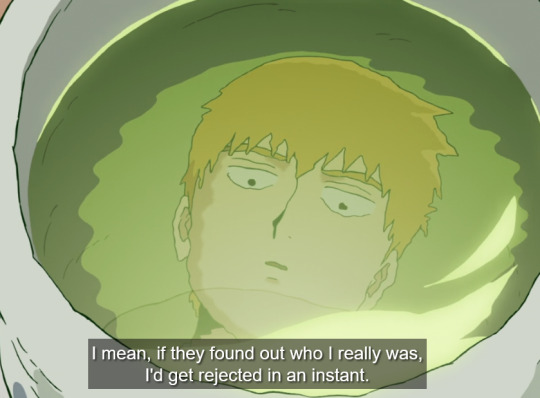
It is the height of irony (and tragedy) that Mob and Reigen admire each other’s strengths so much, yet have no idea they struggle with the same exact fear: that if the people they cared for found out who they truly were, they would reject them. It is why Reigen relies on lies and why Mob suppresses himself.
It is also why Reigen has never actually witnessed ???% until now. It is why Mob has never heard Reigen admit the truth about himself out loud.
And that’s why the final arc feels like such a gut-punch in the best of ways. What is harder than accepting who you are, and hoping for others to accept you as you are? Even at your most deceitful, or your most destructive? Mob Psycho ends with the Confession Arc because that’s the very heart of the story.
#mp100#mob psycho 100#mp100 spoilers#mp100 s3 spoilers#kageyama shigeo#reigen arakata#tearing up as I typed this don’t mind me#I’m a manga reader too but seeing this animated finally got to ne#and then the reigen parallels hit me!!!#I’m not Ready for next episode
9K notes
·
View notes
Note
hi. on your post where you may or may not have ended on 'moffat is either your angel or your devil' did you have maybe an elaboration on that somewhere that i could possibly hear about. i'm very much a capaldi era stan and i've never tried to defend the matt smith era even though it had delightful moments sometimes so i wonder where that puts me. i'd love to hear your perspective on moffat as a person with your political perspective. -nicole
hi ok sorry i took so long to respond to this but i dont think you know how LOADED this question is for me but i am so happy to elaborate on that for you. first a few grains of salt to flavor your understanding of the whole situation: a. im unfairly biased against moffat bc im a davies stan and a tennant stan; b. i still very much enjoy and appreciate moffat era who for many reasons; and c. i hate moffat on a personal level far more than i could ever hate his work.
the thing is that its all always gonna be a bit mixed up bc i have to say a bunch of seemingly contradictory things in a row. for instance, a few moffat episodes are some of my absolute favorites of the rtd era, AND the show went way downhill when moffat took over, AND the really good episodes he wrote during the rtd era contained the seeds of his destruction.
like i made that post about the empty child/the doctor dances and it holds true for blink and thats about it bc the girl in the fireplace and silence in the library/forest of the dead are good but not nearly on the same level, and despite the fact that i like them at least nominally, they are also great examples of everything i hate about moffat and how he approached dw as a whole.
basically. doctor who is about people. there are many things about moffats tenure as showrunner that i think are a step up from rtd era who! actual gay people, for one! but i think that can likely be attributed mostly to an evolving Society as opposed to something inherent to him and his work, seeing as rtd is literally gay, and the existence of queer characters in moffats work doesnt mean the existence of good queer characters (ill give him bill but thats it!)
i have a few Primary Grievances with moffat and how he ran dw. all of them are things that got better with capaldi, but didnt go away. they are as follows:
moffat projects his own god complex onto the doctor
rtd era who had a doctor with a god complex. you cant ever be the doctor and not have a god complex. the problem with moffats era specifically is that the god complex was constant and unrepentant and was seen as a fundamental personality trait of the doctor rather than a demon he has to fight. he has the Momence where you feel bad for him, the Momence where he shows his humility or whatever and youre reminded that he doesnt want to be the lonely god, but those are just. moments. in a story where the doctor thinks hes the main character. rtd era doctor was aware that he wasnt the main character. he had to be an authority sometimes and he had to be the loner and he had to be sad about it, but he ultimately understood that he was expendable in a narrative sense.
this is how you get lines like “were the thin fat gay married anglican marines, why would we need names as well?” from the same show that gave you the gut punch moment at the end of midnight when they realize that nobody asked the hostess for her name. and on the one hand, thats a small sticking point, but on the other hand, its just one small example of the simple disregard that moffat has for humanity.
incidentally, this is a huge part of why sherlock sucked so bad: moffats main characters are special bc theyre so much bigger and better than all the normal people, and thats his downfall as a showrunner. he thinks that his audience wants fucking sheldon cooper when what they want is people.
like, ok. think of how many fantastic rtd era eps are based in the scenario “what if the doctor wasnt there? what if he was just out of commission for a bit?” and how those eps are the heart of the show!! bc theyre about people being people!! the thing is that all of the rtd era companions would have died for the doctor but he understood and the story understood that it wasnt about him.
this is like. nine sending rose home to save her life and sacrifice his own vs clara literally metaphysically entwining her existence w the doctor. ten also sending rose with her family to save her life vs river being raised from infancy to be obsessed w the doctor and then falling in love w him. martha leaving bc she values herself enough to make that decision vs amy being treated like a piece of meat.
and this is simultaneously a great callback to when i said that moffats episodes during the rtd era sometimes had the same problems as his show running (bc girl in the fireplace reeks of this), and a great segue into the next grievance.
moffat hates women
he hates women so fucking much. g-d, does steven moffat ever hate women. holy shit, he hates women. especially normal human women who prioritize their normal human lives on an equal or higher level than the doctor. moffat hated rose bc she wasnt special by his standards. the empty child/the doctor dances is the nicest he ever treated her, and she really didnt do much in those eps beyond a fuck ton of flirting.
girl in the fireplace is another shining example of this. youve got rose (who once again has another man to keep her busy, bc moffat doesnt think shes good enough for the doctor) sidelined for no reason only to be saved by the doctor at the last second or whatever. and then youve got reinette, who is pretty and powerful and special!
its just. moffat thinks that the doctor is as shallow and selfish as he is. thats why he thinks the doctor would stay in one place with reinette and not with rose. bc moffat is shallow and sees himself in the doctor and doesnt think he should have to settle for someone boring and normal.
not to mention rose met the doctor as an adult and chose to stay with him whereas reinette is. hm. introduced to the doctor as a child and grows up obsessed with him.
does that sound familiar? it should! bc it is also true of amy and river. and all of them are treated as viable romantic pairings. bc the only women who deserve the doctor are the ones whose entire existence revolves around him. which includes clara as well.
genuinely i think that at least on some level, not even necessarily consciously, that bill was a lesbian in part bc capaldi was too old to appeal to mainstream shippers. like twelve/clara is still a thing but not as universally appealing as eleven/clara but i am just spitballing. but i think they weighed the pros and cons of appealing to the woke crowd over the het shippers and found that gay companion was more profitable. anyway the point is to segue into the next point, which is that moffat hates permanent consequences.
moffat hates permanent consequences
steven moffat does not know how to kill a character. honestly it feels like hes doing it on purpose after a certain point, like he knows he has this habit and hes trying to riff on it to meme his own shit, but it doesnt work. it isnt funny and it isnt harmless, its bad writing.
the end of the doctor dances is so poignant and so meaningful and so fucking good bc its just this once! everybody lives, just this once! and then he does p much the same thing in forest of the dead - this one i could forgive, bc i do think that preserving those peoples consciousnesses did something for the doctor as a character, it wasnt completely meaningless. but everything after that kinda was.
rory died so many times its like. get a hobby lol. amy died at least once iirc but it was all a dream or something. clara died and was erased from the doctors memory. river was in prison and also died. bill? died. all of them sugarcoated or undone or ignored by the narrative to the point of having effectively no impact on the story. the point of a major character death is that its supposed to have a point. and you could argue that a piece of art could be making a point with a pointless death, ie. to put perspective on it and remind you that bad shit just happens, but with moffat the underlying message is always “i can do whatever i want, nothing is permanent or has lasting impact ever.”
basically, with moffat, tragedy exists to be undone. and this was a really brilliant, really wonderful thing in the doctor dances specifically bc it was the doctor clearly having seen his fair share of tragedy that couldnt be helped, now looking on his One Win with pride and delight bc he doesnt get wins like this! and then moffat proceeded to give him the same win over and over and over and over. nobody is ever dead. nobody is ever unable to be saved. and if they are, really truly dead and/or gone, then thats okay bc moffat has decided that [insert mitigating factor here]*
*the mitigating factor is usually some sort of computerized database of souls.
i can hear the moffat stans falling over themselves to remind me that amy and rory definitely died, and they did - after a long and happy life together, they died of old age. i dont consider that a character death any more than any other character choosing to permanently leave the tardis.
and its not just character deaths either, its like, everything. the destruction of gallifrey? never mind lol! character development? scrapped! the same episode four times? lets give it a fifth try and hope nobody notices. bc he doesnt know how to not make the doctor either an omnipotent savior or a self-pitying failure.
it is in nature of doctor who, i believe, for the doctor to win most of the time. like, it wouldnt be a very good show if he didnt win most of the time. but it also wouldnt be a very good show if he won all of the time. my point is that moffats doctor wins too often, and when he doesnt win, it feels empty and hollow rather than genuinely humbling, and you know hes not gonna grow from it pretty much at all.
so like. again, i like all of doctor who i enjoy all of it very much. i just think that steven moffat is a bad show runner and a decent writer at times. and it is frustrating. and im not here to convince or convert anyone im just living my truth. thank you for listening.
#sorry if this is repetitive or makes no sense or if i got some details of the show wrong#i simply couldnt be bothered to put too much effort into this post#lest it become a research paper and take me several weeks to answer#anyway thats all my opinions#dw#ok to rb
210 notes
·
View notes
Note
penny for your thoughts on salmondean codependency ?
Sure. Fair warning it’s long (was longer but I stopped myself.)
I think it’s complicated in a show that’s had so many different showrunners because they’ve all handled Sam and Dean’s relationship very differently. In Kripke’s era (s1-5) there was a romanticization of the bond. Sure there was a lot of in-depth exploration of how they wound up at the place they were at, spoiler alert: it was all because of John and his obsessive crusade to find the demon that killed his wife. That’s all he cared about and as a result, Sam and Dean had to be everything to each other. But Kripke had no intention of dismantling that at any point because he was (and always had been) writing a tragedy. Gamble continued that too. There was no room for anyone else in their lives and it would always just be the two of them against the world. So Cas had to go. Bobby had to go.
(Actually, it's funny because Gamble didn't intend this at the time, her plan was to kill Cas off, but by Edlund creating the masterpiece that is The Man Who Would Be King, he not only saved Cas from being seen as a villain, but he also deepened Dean and Cas' relationship in such a profound way and inextricably linked the two of them emotionally. And since Cas was eventually brought back, that laid the foundation for a lot of what their relationship would become.)
Up until this point, there hadn’t really been any significant dismantling of perhaps the more unhealthy parts of Sam and Dean’s relationship. Enter Carver. He stripped things down and started to explore what drove these characters. What they wanted and why they couldn’t have it. It starts with Dean being mad at Sam for not looking for him in purgatory, which sets up the whole speech in the s8 finale of Sam’s guilt about letting Dean down, but the thing is, Dean was never honest with Sam about his year away either. He never told Sam he could have gotten out much sooner if he hadn’t stayed to find Cas. I mean Dean had assumed Sam was up there alone doing God knows what to try to bring him back, and yet still he stayed in Purgatory because things were clear there. He needed Cas. Anyway, I just find that interesting, but Cas isn’t a victim of Sam and Dean’s relationship in s8.
Who gets the honour of being cast aside? That would be Benny and Amelia, two characters they introduced in s8 specifically to highlight that Sam and Dean’s relationship doesn’t allow for anyone else to be a significant part of their life. I mean that’s nothing new, we’ve watched that happen many times before. Lisa even said as much to Dean. The thing is this time? It’s framed as a truly sad thing. That moment at the end of 8x10 when Dean has just ended things with Benny and Sam leaves Amelia, and they’re sitting alone drinking beer and watching tv is such a hollow empty moment. This is not what they want. But it’s the way things have to be.
I’m actually fascinated by Sam and Dean’s conversation in the church in the s8 finale. Not so much Dean’s assertion that there is no one else he would put before Sam, but more so what provokes it, which is Sam saying “who are you going to turn to instead of me. Another angel? Another vampire?” See the thing is Dean saying he would always put Sam first is not news. We know this and it’s not really an unhealthy statement in itself either. A lot of people would put their sibling above anything else, not less a sibling who you raised and is the most important person to you. But in this context? After what Sam said? It just highlights how unhealthy they are if Sam believes that Dean having other people in his life means he doesn’t love him enough. That he’s a disappointment to him. That’s so profoundly fucked up.
(Note, Dean tells Sam that he killed Benny for him but he doesn’t say anything about Cas. I think like I said before, this is because Cas and Dean’s relationship has largely existed out of the Sam and Dean stuff up to this point - Sam and Cas don’t even really have much of a relationship yet besides both of their connections to Dean.)
And then from here, things start getting steadily worse. But we also keep being shown how bad they are. Dean lying to Sam, taking away his free will by letting Gadreel possess him. Dean sending Cas away, Kevin dying. It’s all awful. The whole “there ain’t no me if there ain’t no you line” from 9x01 isn’t really said by Dean, it’s Gadreel, but that is how Dean feels. He does think that’s all he’s good for. And over the season we’re shown how much of himself and what he truly wants he’s had to give up because of his ingrained “Save Sammy” and “Sammy comes first” mentality. It’s always been this way for him. In 9x07 we see that he had found a happy home, a good father figure, and his first love, a first love might I add that he had to leave behind with no real explanation because Sam needed him, and Sam comes first.
I mean just one episode earlier we had him rushing out the door elated about seeing Cas and spending time with him, only for their time together to come to sad and melancholic end when Dean once again leaves Cas behind without any real explanation, because despite what he wants Sammy comes first. What he wants doesn’t matter.
See I think after the Gadreel stuff comes out is where the narrative starts to get a little wonky for me. You can clearly see that this was intended to be a shorter story that they ended up stretching out to a much longer one because of renewals. There’s also the fact that this is a formula show so they can’t necessarily be separated for longer than an episode or two. S10 is a rough one to get through at times, I think the themes still mostly hold up but it’s a rough one to get through.
S10 highlights all the connections that Dean has, Cas, Charlie, Crowley even, but Sam doesn’t really have those bonds in the same way. For Sam it’s just Dean, so he goes down a reckless destructive “do anything to save Dean!” path and so many innocents pay the price, and ultimately with the release of The Darkness, the whole world.
They skirted right up to the edge of exploring just how toxic and dangerous their relationship had become in the season 10 finale.
DEAN: I let Rudy die. How was that not evil? I know what I am, Sam. But who were you when you drove that man to sell his soul... Or when you bullied Charlie into getting herself killed? And to what end? A..a good end? A just end? To remove the Mark no matter what the consequences? Sam, how is that not evil? I have this thing on my arm, and you're willing to let the Darkness into the world.
I can’t say evil is the right word, they were never evil, but they were wilfully blind to everything and everyone else when it came to saving each other. S10 tested my love for the show because after watching it, because there was certainly a feeling that the two of them had become the villains of this story. And don’t get me wrong, I didn’t have a problem with that, it’s just after 2 seasons of this I can’t say I had a lot of faith that this was going to be properly addressed or if we were going to keep going in circles around it. Keep being shown, it’s bad and then nothing much being done to fix it. Your mileage may vary on how it was handled, but I think s11 did a relatively ok job considering it wasn’t the end of the story, and the show needed to keep going.
See from Dean’s side a lot of the codependency rests on
1. His father’s orders to always save Sammy
2. His low self-esteem where he sees himself as nothing but a blunt instrument.
3. His guilt at not being able to perfectly fulfil every familial role in Sam’s life
4. His belief that no one could choose to love him but family has to love you.
5. The unhealthy example of what it should look like to love someone that he got from John. You give up everything but them.
For Sam (and honestly it’s not as clear for me as Dean’s side is so feel free to correct me/disagree on this)
1. Everytime he’s tried to leave and create his own life it’s never ended well.
2. His guilt over wanting freedom and a normal life when he was younger (I’m referring specifically to Stanford era here)
3. His guilt over everything Dean has given up for him.
4. John.
5. Jess.
Ultimately it all comes down to isolation. They both had to be everything to each other, and the deeper they got into this fight, the more people that they lost, the tighter they clung to this notion of family and brothers. I think s11 (and 11x23 in particular) was an important turning point, both for Sam and Dean’s relationship, as well as for them as individuals. Because they weren’t alone there anymore. Cas was there. Sam let Dean walk to his death. Of course, it would devastate him, but he knew it was what had to be done. And he didn’t walk out of that bar and go back to the bunker alone. He had Cas, he had someone who cared about him and wanted to help him and talk to him. Sure Dean asked Cas to take care of Sam for him (you know after Cas offered to walk to his death with him) but Sam let him. He let him be there for him. We didn’t get to see much before the BMOL showed up and blasted Cas away, but still, we saw enough.
I think that’s a significant difference to note why their relationship was different in the Dabb era. It wasn’t just them anymore. Cas was an important member of their family and given a level of importance he’d never been given before and couldn’t have been when the story they were telling was of the dangers of their codependency. Mary was back. Eventually, Jack would become a part of their unit too. Just the two of them wasn’t enough for them anymore. This is made abundantly clear with all of Dean’s desperate attempts to get Cas to stay in s12, followed by his inability to keep going when they lose Cas and Mary in s13. Similarly, Sam really struggles when they lose Jack and fail to get Mary back later in the season.
Another big moment is Dean letting Sam go alone to lead the hunters against the BMOL in 12x22 while he stays back to try and reach Mary. Like he tells Mary, he’s had to be a brother, a father and a mother to Sam and he never stopped seeing him as his kid, but in that moment he makes a choice. He lets Sam take charge and he shows that he trusts him and believes in him. He knows he can handle it.
Sometimes it’s not even a character growth thing. Sometimes having other people there stops you from making destructive choices even though that’s still your first instinct. I’m thinking specifically of 13x21 after Sam was killed. Dean would have run headlong into that nest of vampires and got himself torn apart, but Cas was there to stop him. He was able to make him see reason.
Basically, I think that for a long time, they thought the only relationship they could have was each other, which then became a self-fulfilling prophecy because their desperate attempts to keep each other around led to them losing the people around them. They eventually started to learn that that wasn’t true, they could have more, they were allowed to want more, and that it wasn’t an either-or situation. Dean didn’t have to choose between Sam and Cas. They didn’t have to choose between each other or Jack. The same goes for Mary. Different relationships can coexist without threatening each other, and not say that their relationship in s12-15 was all smooth sailing, but it was certainly so very different from everything that came before.
(There’s maybe a point to be made about how they didn’t have anyone or anything in the finale and how that relates to the story we got, but honestly I have no idea what the intention was with any of the choices made in that episode so I’ll leave it at that for now.)
980 notes
·
View notes
Text
The “One” Divided Into “Two”
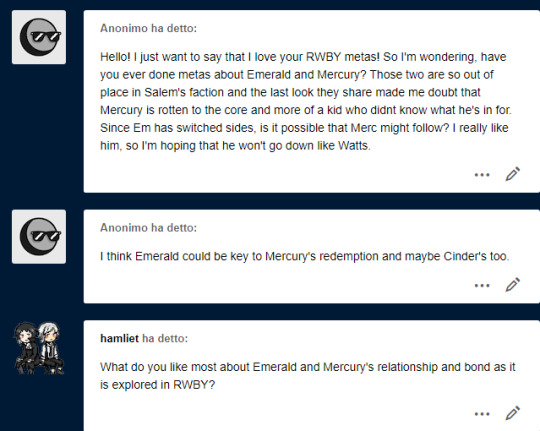
Hello anons, hello friend,
these asks can be answered together!
First of all:
Hello! I just want to say that I love your RWBY metas! So I'm wondering, have you ever done metas about Emerald and Mercury?
Thank you! And yes, I have written a little bit about Mercury and Emerald here. I would also recommend this wonderful meta by @hamliet because it has an interesting Mercury theory in it.
Now. this answer is gonna mix some analysis with speculation because Emerald and Mercury’s story must still enter its climax. Once it does and we are given a specific interpretative key I will be happy to write more metas on them!
I’ll start with this:
Those two are so out of place in Salem's faction and the last look they share made me doubt that Mercury is rotten to the core and more of a kid who didnt know what he's in for. Since Em has switched sides, is it possible that Merc might follow? I really like him, so I'm hoping that he won't go down like Watts.
In my opinion, yes and here is why.
CHILDREN LOST IN A NARRATIVE
1) Emerald and Mercury have been child-coded since their first appearance:
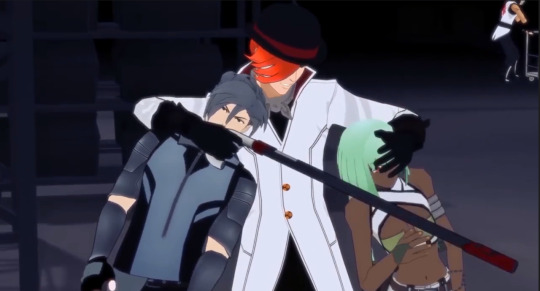
Roman: Oh, look! She sent the kids again! This is turning out just like the divorce!
2) Both have received a save the cat moment early on:
Emerald: It's almost sad.
Mercury: Emerald, get up, we need to go. (...) Emerald!
Both child-coding and save the cat moments are often used to make characters more sympathetic and this applies to both Emerald and Mercury, even more so than Cinder.
This is why, for example, the major death they are directly involved in:
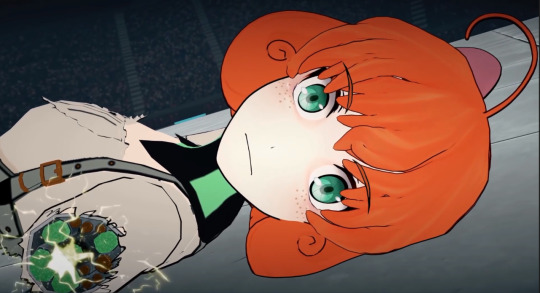
turns out to be a temporary one.
As a side note, I like thinking of Emerald and Mercury as the Cat and the Fox in Penny’s story since they act as false friends to the main cast, betray them and cause Penny’s first death. Moreover, in the novel, both characters end up suffering consequences for their life-styles. The two murder kids are the same:

At the same time, details about Emerald and Mercury’s backgrounds and motivations are given to the viewers pretty early on:
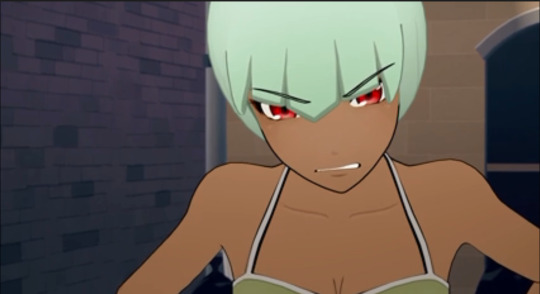
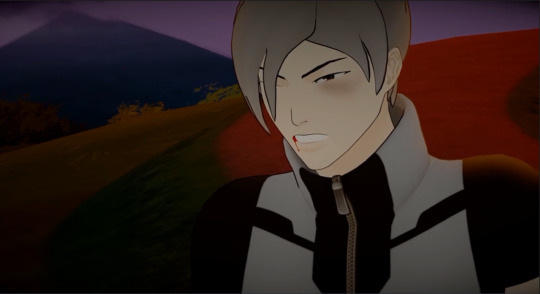
We are shown Cinder recruiting both and these scenes clearly paint them as two vulnerable kids that get manipulated and groomed:
Raven: Two children you’ve tricked into following you.
Emerald is presented as a scaredy cat and Cinder wins her over by promising the bare minumum aka some security and basic care.
Mercury is given even less aka a narrative to keep himself together:
Cinder: And you're his son. We saw your fight from the treeline. He's taught you well.
Mercury: Guess so.
Cinder: What's your name?
Mercury: Mercury.
Cinder: Mercury... Tell me, are you anything like your father?
Mercury: All my life, my father trained me to be a killer, an assassin like him. And then moments after I killed him, you two showed up looking for someone with my exact skills. Just felt like it was meant to be.
Cinder praises his abilities and frames his trauma as something that makes him strong, not broken. And Mercury has completely embraced this narrative since then.
In short, Emerald and Mercury are framed as two kids lost in an illusory narrative Cinder has crafted. That said, they are also characters in a proper narrative and they are given sympathetic backgrounds and positive qualities that hint they can be better than they currently are.
In particular, Emerald should overcome her emotional dependence on others to make the right thing:
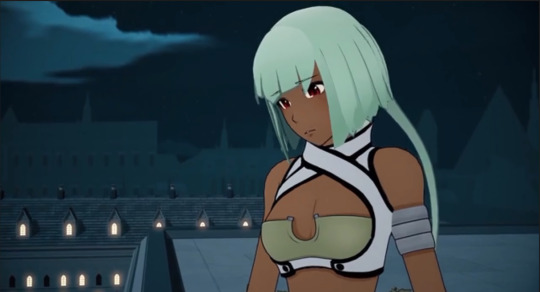
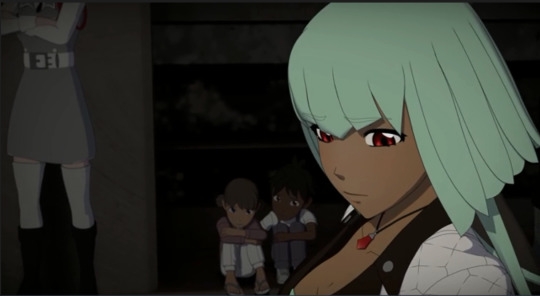
In both volume 3 and volume 8 she is shown the destruction of a city. However, the first time she puts distance between herself and others’ pain, as symbolically conveyed by her looking from above. In volume 8, though, she is shown the same pain up close and she can’t ignore it anymore. This is why the others drag Emerald towards the people crying and light invades the screen when she finally meets the sheltered crew. She is forced to face an uncomfortable truth she wants to ignore.
Mercury should instead let himself depend on others more. He should open up to others and fight for his one positive bond:
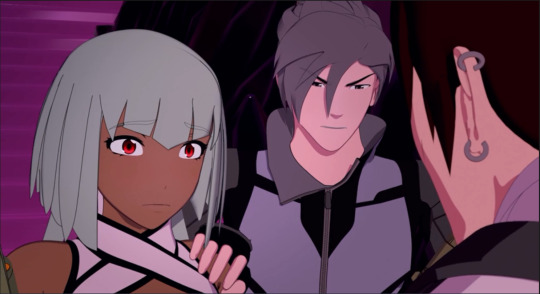
Mercury: Back off, freak.
Which leads us to:
What do you like most about Emerald and Mercury's relationship and bond as it is explored in RWBY?
EMERCURY: COMPLEMENTARITY
Emerald and Mercury’s bond being a key one is conveyed both symbolically and in terms of their respective abilities.
When it comes to their abilities, I have written about it in the meta linked above:
In short, Emerald mostly relies on her semblance, while Mercury mostly relies on his legs and fighting prowess.
This detail adds to the idea that Emerald and Mercury have been acting as a unit and have been complementing each other. Emerald acts as the “soul” and Mercury as the “body”.
The soul is one’s personal essence (like the semblance). It is where (once again) wishes reside. The body is what protects the soul and is animated by instincts and self-survival.
They complement each other. This complementarity is shown in Emerald and Mercury’s fights.
In the Vytal festival, Mercury takes on both Coco and Yatsuhashi for a short while, so that Emerald can size her chance to fight Coco at her own terms (and she wins by using her semblance).
In the Battle of Heaven, Emerald uses her semblance to help Mercury fight and, in a sense, she compensates for his lack of one:

The human soul is about wishes, but also duties:
Penny: I feel like I wish I could do both the things I need to do and the things I want to do. Is that normal?
One must accept their feelings, but also struggle with them:
Winter: But yes Penny, we must still acknowledge our personal feelings, wrestle with them. It ensures us that we’re on the right path. It’s what makes us human.
And must do the right thing out of their own free will:
Winter: Penny. The general is making hard choices so we don’t have to.
This is Emerald’s personal struggle. She must let go of her feelings for Cinder and fight her own fear in order to do the right thing.
The human body lets people feel both others’ warmth:

And others’ cruelty:
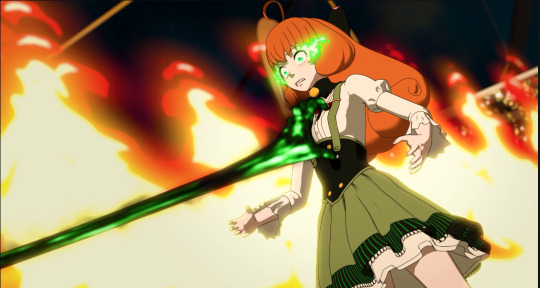
However, Mercury refuses to feel both. He refuses to truly process his own trauma and pushes his feelings of care for Emerald away:
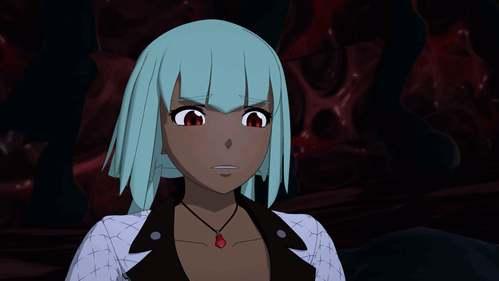
As far as their symbolism goes, they are linked in at least three different ways.
1) One of the attributes of the Roman god Mercury is that he is the protector of thieves and Emerald’s surname capitalized means thief. What is more:
Mercury: Ooh, Emerald! Master thief! Please don't take my money! I barely have enough to get by!
2) Mercury/Hermes is also the god of alchemy and the one who wrote the Emerald Tablet aka a tablet with the truth of alchemy on it. You, @hamliet, have written a meta on it, so I won’t add more.
3) According to at least some traditions, emerald is the gemstone associated with the planet Mercury.
So, it is clear the two characters are meant to be important in each other’s arcs.
Let’s now look at Emerald and Mercury’s bond, as it is explored through their interactions.
Mercury clearly cares about Emerald and gets along well with her. She is the only person he shows vulnerability to.
This is what their scene in Lost is about:
Emerald: Why did you come with us, the night Cinder and I found you?
Mercury: Why are you asking--
Emerald: Just answer the question.
Emerald is trying to open herself up and wants Mercury to open up too. This is why she gets annoyed when Mercury gives her a superficial answer. Still, in that conversation, Mercury is genuinelly trying to answer Emerald’s feelings:
Mercury: I'm sorry you didn't have a mommy that loved you, but I had a father who hated me! He never went easy on me! Every day of training was a beating. And when I unlocked my Semblance, he stole it with his! "This is a crutch!" "This makes you weak!" He told me I could have it back when I was strong. So I got strong, but I never got it back! I've had to work harder than anyone to get where I am. You may not like it here without Cinder, but I think I'm right where I'm supposed to be!
Here, Mercury is telling Emerald details of his past he would not be sharing if he did not trust her. He can’t let himself be completely vulnerable, though, so he discloses them by lashing out at Emerald. He mixes violence with authentic vulnerability and also with care:
Mercury: Cinder doesn't care about you! She doesn't care about either of us!
He has seen how self-destructive Emerald can get when it comes to Cinder:
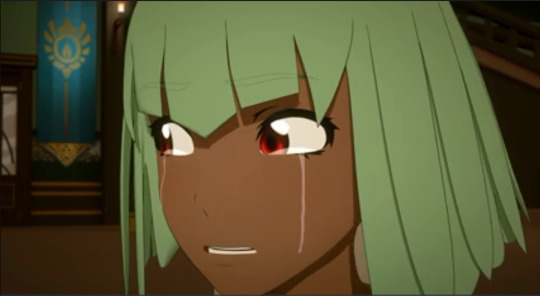

And he is trying to have Emerald move on from her obsession.
However, Mercury’s small steps towards opening up and caring for another person are constantly challenged:
Tyrian: Oh yes, the world is mean, and I'm a big, bad man now just like the others.
Mercury: How long have you been standing there?!
The moment he opens up to Emerald, Tyrian appears to threathen and mock him.
Mercury’s positive development lies in accepting his own feelings of pain and in sharing them with others, so that he can be helped. However, the environment he is in goes in the way of it:

Emerald: Mercury, I wanted to...
Here, Emerald is trying to either apologize to Mercury for their fight or to at least check out on him. Still, Mercury is not listening to her because he is too frightened by what Salem is doing.
Mercury’s current struggle is conveyed in a nutshell by the glance he gives to his left in Midnight:
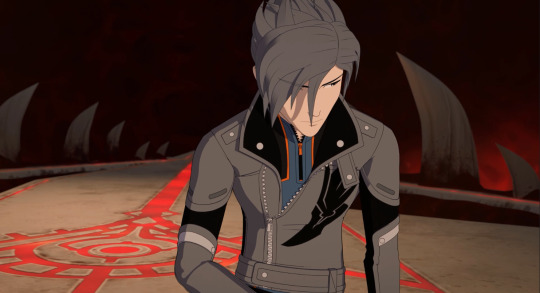
Is he looking at Emerald out of concern?
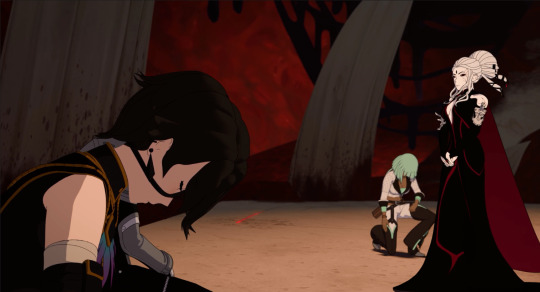
Or at Salem out of caution?
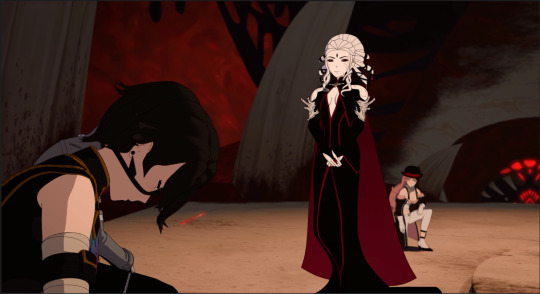
It is not clear. Still, what is sure is that Mercury should focus on Emerald, but Salem goes in the way. He deep down wants to care about others, but he is too scared to do so:
Tyrian: All you ever learned was pain and violence, and now you're too afraid to leave it. Such a tragedy.
At the same time, Mercury is for Emerald what she has been looking for in Cinder:
Emerald: We don't need him! Everything was going fine!
She initially refuses him, but it is clear that with time Mercury becomes the thing most similar to a family Emerald has:
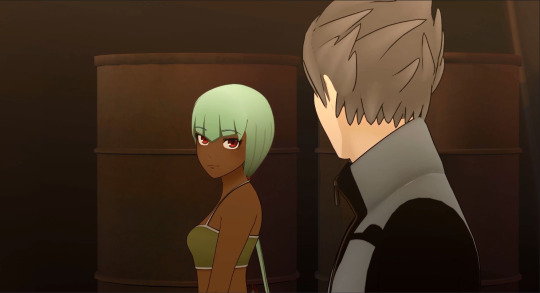
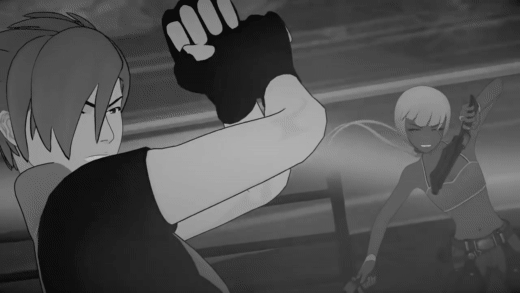
She has been so fixated on Cinder and on how she can be worthy of Cinder’s love that she has missed how much Mercury has tried to protect her all along.
This is why Hazel is important for Emerald’s development:
Hazel: No more Gretchens, boy.
His sacrifice is about breaking his personal cycle of pain. His story starts with Gretchen dying when she was only a girl and it ends with him preventing another girl’s death. At the same time, he also helps breaking the cyle of abuse between Emerald and Cinder.
Emerald is told the truth about her relationship with Cinder by Mercury. Moreover, it seems something finally clicks for her here:
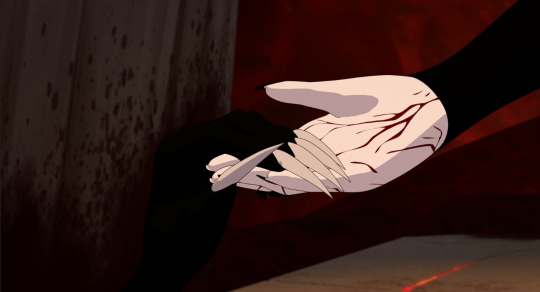
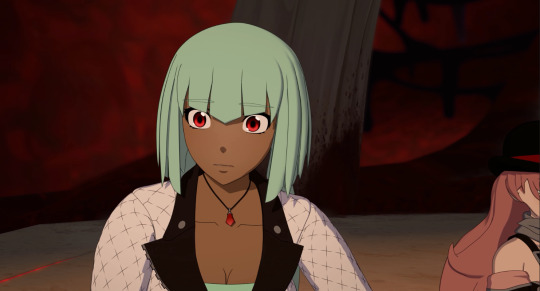
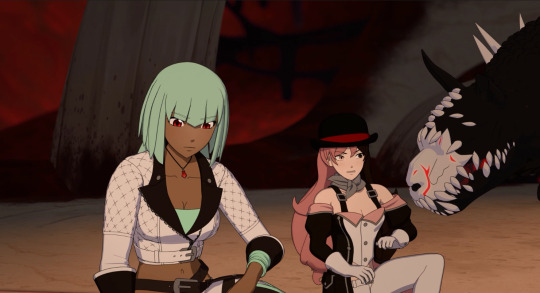
She observes Salem’s manipulation of Cinder and understands Cinder has been manipulating her in the same way.
However, it is thanks to Hazel’s sacrifice that Emerald sees what a genuine parental bond should be like. It should be about the parent protecting the child:
Hazel: What Gretchen would have done. And that starts with getting you away from here. Both of you.
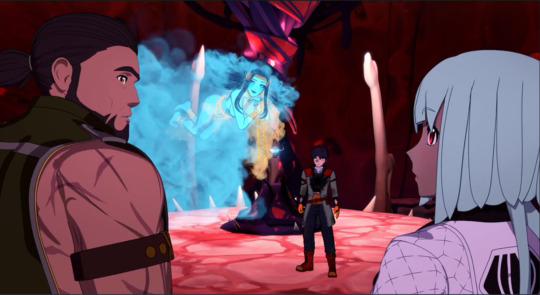
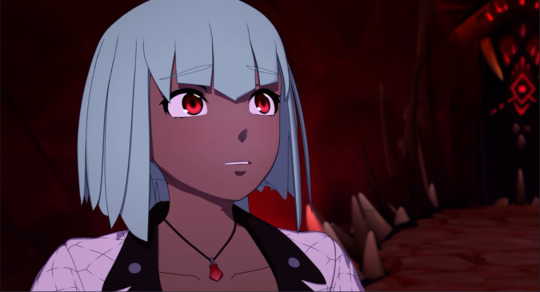
And not the child protecting the parent:
Emerald: I know I can’t beat you. But I can fill that thing full of holes before you take me down.
It should be about the parent caring for the child unconditionally:
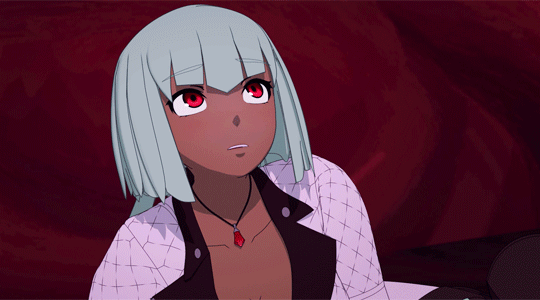

Hazel: Go.
And not about the child working hard to gain a parent’s love:
Cinder: You… You brought me back here. We failed.
Emerald: Cinder, you were hurt. I was just trying to help.
At the same time, Hazel’s death has taught Emerald the pain of losing a loved one:

And has forced Emerald to stand on her own two legs:
Oscar: I've seen what you can do, Emerald. However this fight ends, we could really use someone like you.
She can’t be protected forever, but she should start protecting others. She is powerful enough to do so and she must accept this responsibility.
So
I think Emerald could be key to Mercury's redemption
I think so too. Emerald saving Mercury is the perfect objective for her personal arc. It forces her to act as the savior instead of the one being saved.
Moreover, Mercury told her the truth about herself:
Mercury: You're in denial.
So Emerald might do the same for Mercury. This would also fit with her being the Emerald Tablet. The Tablet is written by Mercury to convey the truth to the world. Here, it might very well be the inverse: the Emerald Tablet might convey the truth to Mercury.
In general, Mercury and Tyrian’s foiling has to pay off, just like Emerald and Hazel’s:
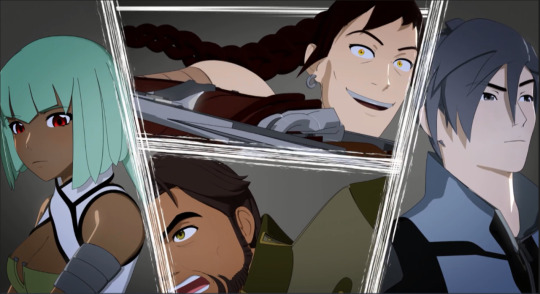
The set-up is there for Tyrian and Mercury’s subplot to be about breaking cycles as well. Mercury’s story is about a child left alone with his abuser. Nobody comes to save him, so Mercury is forced to save himself by killing Marcus. Still, this only leads to him being stuck in the idea he is nothing, but an extension of his father. Right now, the cycle is repeating, but it is possible this time things will go differently because there is at least one person who cares about him.
Not only that, but (and this is nothing, but a baseless theory) even Qrow (aka a character who has unfinished business with Tyrian) might be a thematic fit to help Mercury:
Mercury: Bad hair, used a scythe, and smelled like my dad after a long day. It was him.
After all, Mercury himself draws a comparison between Qrow and his father since they are both alcoholic. However, Qrow has started a journey of rehabilitation for the sake of his nieces and their friends.
Qrow sees himself as bad for others and fundamentally unlucky because of his background and his semblance. So, his third fight with Tyrian being about saving a kid, who, in a sense, is even less lucky than him and has no semblance might be thematically fitting.
Despite it all, Qrow found a family and a place to belong and he might help Mercury find his (Emerald) as well.
SEMBLANCE OF THE SELF
Got no gun
But I gleam like a blade and I'm harder than iron
Delusion
I'll steal til your blind and defeat you from inside your mind
Emerald’s best weapon is her semblance, while Mercury’s semblance was stolen, so he could become a weapon.
This difference symbolizes their respective reactions to abuse.
Emerald uses her illusions as a coping mechanism.
This mechanism is well conveyed in CEM’s fight against Amber:
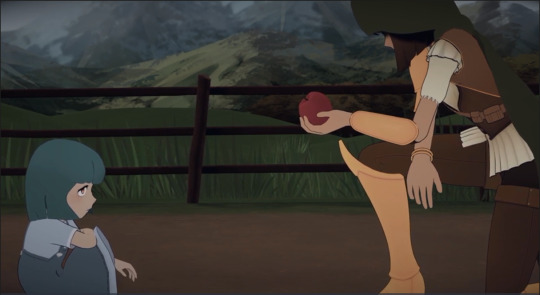
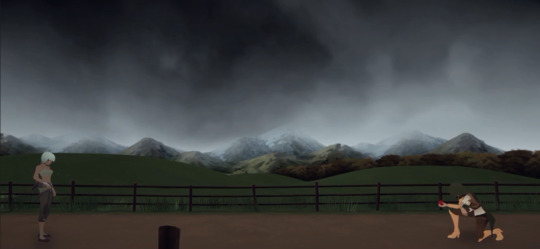
On one hand, Emerald creates a child version of herself who is well dressed and owns a bike. It is a rich version of Emerald because she must think that is the kind of child others would stop by to help. She does not believe she is likable or lovable. This is why she makes an illusory alter-ego, which is both true (she deep down is a crying child) and false (she is a street rat with nothing).
In general, this is Emerald’s way to approach others:
Emerald: Just left the stadium after your amazing fight! You guys were awesome!
Ren: Because she's scared. Just like us..
Emerald: Or maybe because I know how to get out of here. Anybody coming?
She either fakes an overly friendly demeanor or acts tougher than she is. In any case, she hides her true self.
On the other hand, Emerald is symbolically trapping herself in an illusion together with Amber. Amber can’t see the dangerous thief in front of her, but Emerald too can’t see the generous woman who is offering food to a crying child:
Cinder: Follow me, and you’ll never be hungry again.
Cinder promises Emerald food and love and this lie makes the girl unable to see the genuine article when it is right there.
So Emerald tricks both others and herself. This is how she survives abuse.
This is why she keeps believing in Cinder while she is gone:
Emerald: You’re here! I knew you’d co--
And this is why symbolically her semblance grows stronger in an abusive environment:
Emerald: I’ve been working on my Semblance. I can help. I won’t tell anybody.
Salem: You really have been honing that Semblance of yours.
After all, this is when Emerald gets a “power-up”:

She has just lost Cinder and finds herself stuck with Salem. Her reaction is to have a breakdown and to project an illusion in the minds of nine people, when she had previously stated she could only do one/two minds at most.
Mercury weaponizes his trauma.
This is why his legs are Mercury’s true weapon, while Talaria is there just to cover and embellish the pain and ugliness under it.
Mercury fights Amber with only its bare legs because symbolically his trauma is still fresh and he has yet to work out a structured coping mechanism to it. His meeting with Cinder is the first step in this construction that evolves in the following months and is still evolving:
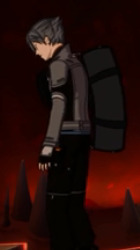
In CEM’s fight against Amber, Mercury uses his unfeeling legs to whitstand the violence of the elements:

Fire
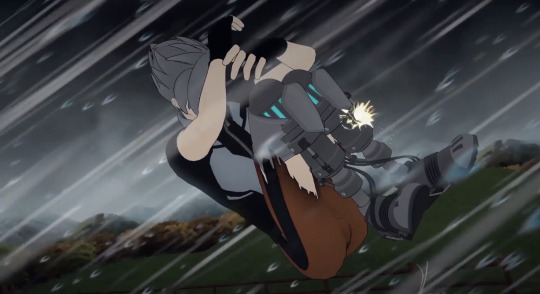
Earth and Water
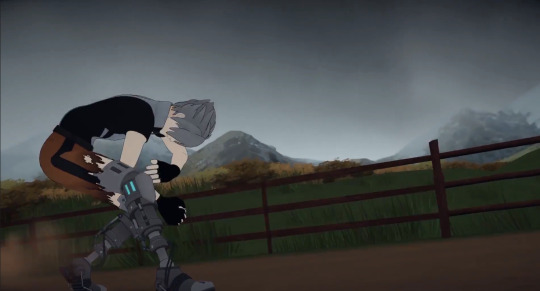
Air
He goes through the whole cycle without feeling any pain simply because his trauma has made him unfeeling:
I'm the one
That was ripped from the earth and exposed to the sun
Marcus has literally turned Mercury into Iron:
But I gleam like a blade and I'm harder than iron
Still, the point is that mercury as a metal is not as hard as iron, but (in the alchemical scale of metals) is way more refined and closer to gold. Mercury can be better than his father, but his way to survive abuse is to repress himself.
This is why his semblance was stolen by his abuser. It is because abuse has taken away Mercury’s personhood.
So, both Emerald and Mercury face abuse by masking or repressing themselves. The difference is a matter of degree. Mercury can suppress his emotions and needs more, while Emerald can’t.
Theirs is a foiling about feeling too much to the point of self-harm and of feeling too little to the point of negation.
So, Emerald must struggle with her feelings not to be controlled by them, while Mercury must aknowledge them.
Emerald’s Hallucinations is a Semblance of The Self because it hides both Emerald herself and the truth.
This is interesting because, as stated above, the Emerald Tablet should convey the truth about alchemy. However, Emerald’s environment has turned her into an inversion of herself:
I'm the one
Who rose out of filth and was loved by no-one
She is a gemstone, but is currently covered in dirt. She needs to polish herself, so she can shine and fit better in her allusion.
Mercury’s stolen semblance is a Semblance of The Self because it is linked to Mercury’s self-expression, which he must claim back.
Until then, he is bound to be stuck in an abusive cycle as nothing, but a weapon.
In general, there is some symbolism around Mercury which needs unpacking:
Mercury quoting Marcus:"This is a crutch!" "This makes you weak!"
Firstly, he has clearly interiorized what his father told him here. He refuses the idea of weakness and crutches to the point that his prosthetics, which are literal crutches get turned into weapons and even covered by other weapons. However, this refusal of crutches means Mercury can’t heal. After all, crutches, bandages and treatment are necessary to become healthy once again.
Secondly, there is this:
I'll run circles round ya, I can touch the sky
The God Mercury’s main attribute is that he can overcome any boundary. He can go wherever he wants in no time. However, Mercury is the opposite because no matter what, he can’t leave his abusive environment. This has to do once again with his father’s abuse which culminated with Marcus taking Mercury’s legs. This is symbolically why Mercury is trapped.
Like for Emerald, Mercury’s arc should be about growing into his allusion, so that he can finally be free.
Still, how to turn Emerald and Mercury in the positive versions of their allusions? The answer has to do with this question:
(I think Emerald could be key to) maybe Cinder's (redemption) too
I’M THE ONE
Emerald and Mercury are two parts of the individual (body and soul) and two parts of a Huntsman (semblance and weapon):
Ren: A common philosophy is that a warrior's Semblance is a part of who they are.
Ruby: Just weapons? They're an extension of ourselves! They're a part of us! Oh, they're so cool.
Together they make a unit. Together they make Cinder. They are two sides of her trauma, her two sins:
Emerald: Actually, I was wondering, do you have any copies of "The Thief and The Butcher"?
And the wounds behind those sins.
This is why Cinder takes them in, but also why she abuses them.
She uses them as weapons:

In CEM’s fight against Amber she lets them go in first and has them take the majority of Amber’s hits.
Not only that, but she uses them as “red herrings” she hides behind.
She acts as if Amber’s blow takes her out of the fight, while Amber focuses on Mercury who resists her attack:

She has Emerald display her semblance at full force, so that the girl becomes Amber’s first target:

She makes her own illusion where Emerald and Mercury are her smokescreen.
However, her two disciples are not just things she can use as she pleases. They are two people who depend on her:

Mercury: You mean--
Emerald: She's alive?
They are literally two kids she takes in framing their relationship as parental/hierarchical hence she is responsible for them.
However, she fails them and leaves them in a dangerous environment. This is why they both leave her out of self-survival.
Narratively, Emerald and Mercury are two kids that must grow up. Right now, they are in some kind of adolescent phase. They have started their emancipation from their “parent”, but they have still to grow until they’ll be able to truly face Cinder.
It will probably be in this confrontation that they will affirm their growth. Right now, Cinder does not need to be coddled, but to be called out. Both Neo and Watts try to, but Cinder ignores them and retaliates against them. She needs a call out she can’t ignore and Emerald and Mercury are too rooted in who she deep down is for her to be unaffected by them.
At the same time, it would mark Mercury and Emerald’s first step into adulthood. Only then they can stop being a “half” and can truly become “one”, so a whole person.
#rwby#rwby meta#emercury#emerald sustrai#mercury black#cinder fall#my meta#asksfullofsugar#anonymous#hamliet#murder kids#rwby murder kids
85 notes
·
View notes
Note
It’s me the Shigaraki survivalist again lol
It’s cool you don’t agree I guess I just want to get my thoughts out
You said it’s unrealistic for Deku to save Shigaraki and them to work together—but the way I see it is that’s exactly what the story has been building up to. In a world where nothing is really “unrealistic” I really truly think it’s very in the realm of where the story is going. Shigaraki does look tired, because he has never been given a break. The thing is, BNHA isn’t a tragedy! (I think Hawks’s arc will be a tragedy but that’s a whole different discussion)
I just cannot see how Deku will be crowned “the greatest hero who ever lived” meanwhile the one person who needed him most is lying there dead. It just doesn’t feel convincing, especially in a shonen story. As far as the story is concerned, Shigaraki is still a child and never had a chance to grow up (it’s a coming of age story for Deku and Shigaraki). And you can’t celebrate being the greatest hero who ever lived while a “child” is dead. And I 100% expect Shigaraki and Touya to be very difficult to save (kinda like Kota from the training camp arc, but Deku saved him didn’t he?)—they’re gonna decline the help at first obviously. They have no reason to trust heroes, which is why I think Deku and Shoto are going to have to prove that they mean it—and they will, because they do.
I just feel like Shigaraki dying completely cancels out Deku’s main goal of “saving everybody”—which has been his thing since the beginning. Shigaraki was, in the eyes of the narrative, All Might’s responsibility to save, and he failed. Not only is Deku going to have to clean up the OFA/AFO mess, he’s gonna have to clean up the mess that All Might could have prevented (I’m not blaming All Might completely but as far as the story is concerned, and All Might is concerned—he definitely bares some responsibility for Tenko’s fate).
It’s as you said we don’t know what Horikoshi is going to do, but a girl can hope lol
I just don’t feel like the story is going to end with the message of “not everybody can be saved”. I just feel that there is so much more hope in this story than people give it credit for! Shonen typically reeks of hope and optimism, and even now BNHA still has that hopeful, optimistic energy, not grimdark realism. I think Horikoshi will pull this off and it’s gonna be awesome. And if you are right and Shigaraki does die, I honestly will consider it a huge waste of a character who could have and should have been saved, just like Touya, who I also think is 100% going to make it out alive.
Hey, Shigaraki Survivalist!
Glad you’re putting you opinion out here.
Getting onto matters, I would like to maybe clarify my statement: I do not think it is unrealistic for Shigaraki and Deku to work together (I think rather that it would be absolutely fair, and maybe cathartic) and I do agree that is what is likely to happen, sooner or later.
As for BNHA not being a tragedy, I think that it already is. Look at how Touya, Shigaraki and the same Izuku grew up: discriminated against, bullied, neglected and abused. If this is not a tragedy, I do not know what is. But if by that you meant that the general mood of the story is supposed to be one of instilling hope and instead letting people know that there is always a way one, and that there is still some possibility of saving if there is a will. I fully agree on that. The themes in BNHA are the real tragedy, but you are absolutely right when you say that the message is ‘People make mistakes. But that’s not the end. They can change and correct those mistakes, apologise, amend. Things can change.’ and not ‘Not everyone can be saved’ (even if, here, I would like to argue that Twice’s death message is exactly that but I don’t want to digress).
Also, not going to lie, I really like the positivity I feel from your message. It puts a smile on my face thinking that there is someone out there fully believing that salvation will come because there is someone who wants it to come. It’s a good thing. It’s a thing I, for one, do not have so thank you for doing that, this really brightened my evening.
Now, onto a more heavy part of the post. I wanted to talk about All Might, and how he did fail, even if not entirely by himself, to save Shigaraki. First of all, I would like to notice the particular panel which tells us that ‘You can save only those you can reach’.
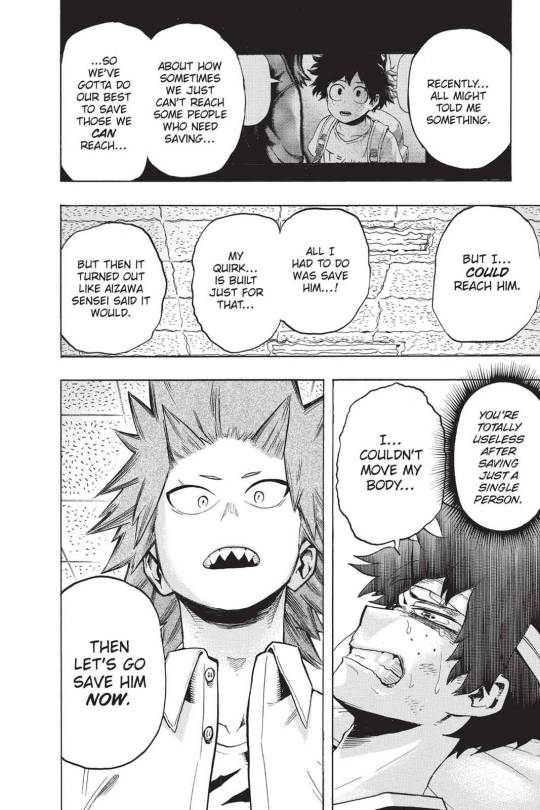
This panel is telling in more ways than one. All Might specifically addresses Izuku in saying this, while not literally meaning it (or at least not expecting Izuku to understand it so literally). All Might ( and I talked about it here) is a character which sets up the bar high for Hero standards (and is seen as an idol so far gone, that no one could ever possibly reach him) - and that is exactly why Izuku bears this 'lesson' stoically and tries to save everyone ever more than before. Because if All Might could do it, Izuku feels like he should be able as well (while not considering the disproportion in between them, and I mean in experience and just relatively emotionally).
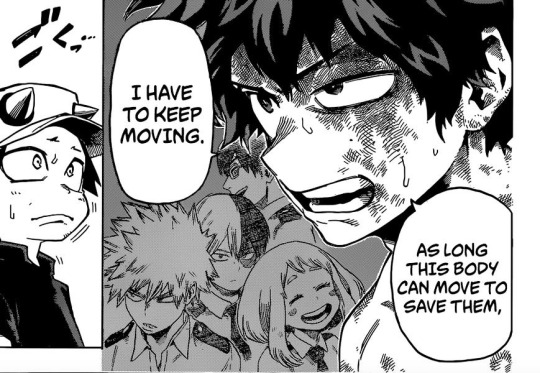
I mean Izuku feels a high burden with OfA, and to deal with AfO, and sometimes he can get very much extreme - but exactly for that, as you said, he would never feel as if he succeeded if he does not manage to save Shigaraki. Because if All Might is capable of brushing this aside, justifying himself by saying that he couldn't have done anything to prevent it and that it is impossible after all to save everyone, Izuku is not. Izuku feel so deeply that he cries for others, he rages for others, he longs for others with a great smile on his face because that is what it's expected of him.
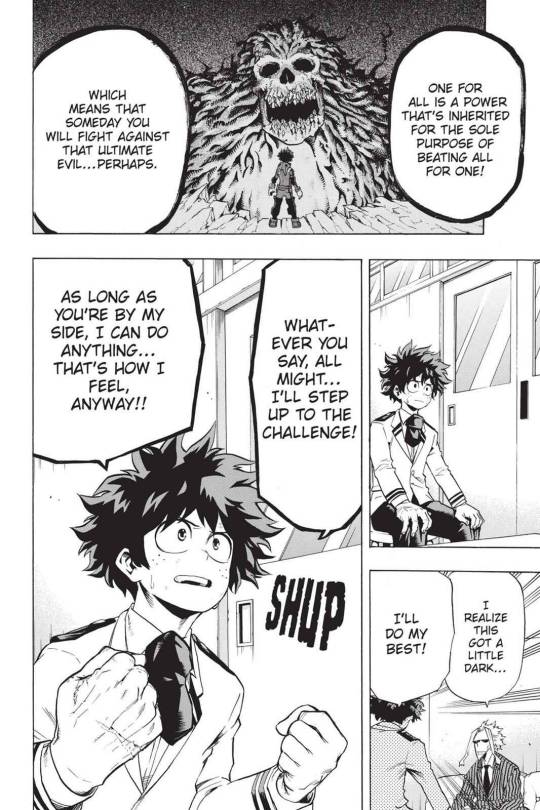

And he likes to fulfil those expectation, whether that kills him, injuries him or anything else (as we saw him being all bandaged up in 299 and with no sign to recover any soon).
However, this what I mean when I say that Tomura looks tired:
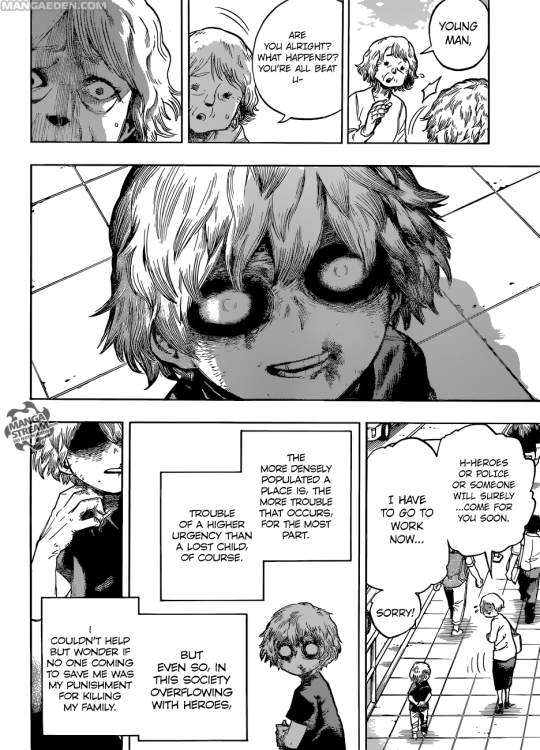
He fails to understand how him not being saved is not actually a fault of someone (heroes/society, you name it - even if he does realise much later), but his first instinct as a kid is to blame himself and to tell that this, is is his punishment. He deserved it. And he does deserve to a degree what has happened to him since, because he is guilty of something he will never be able to forgive himself for and that is why he is they he is now.
I do think, that Touya, even being more self-destructive than Shigaraki, is an easier subject to save. I am not saying this because I think Dabi’s trauma or problems are easier to solve, but because Shouto understood him (to some extent) and with the sentence ‘I am him? referring to Touya and his intentions he is unwillingly showing us that Touya’s path to redemption (summed with Endeavour’s arc) are all pointing at Touya being saved, no matter how bad the situation gets. He, still scarred and lonely, does have a family out there caring for him. Or at least wanting to get to the bottom of things and not leave him to burn to death, alone. Again.
Shigaraki, on the other hand, does not have such a thing. Kurogiri has been captured, AfO is using him and the only guy who thought of Tomura as a human being, other than a bad villain, is Deku. I do not want say that this is not enough, but with all the burden that Izuku is already carrying at the moment, can he also bear on himself the weight of saving Shigaraki? I really hope he does, but as anyway as it will be, I think that Deku will try. He will try to get that hand reaching out to Tomura and even if skeptical about it, I hope Shigaraki takes the chance and takes it. He does deserve a break. He deserves a blanket, a cup of steaming tea and a hot long nap in a warm bed. A hug is optional.
One of the themes I never touched upon is also, the found family of the League and Hawks. I really am waiting for more insight into the League’s members feeling for Twice, and maybe holding a funeral. I am also waiting for them to discuss Hawks.
On which, my last point for this post: Hawks’ story, serves as a parallel to Dabi’s. We see how the abuse can bring to two extremes: one becoming a villain and focusing on hate, and the other focusing on idolising and becoming a hero (and in the meantime trying to forget everything else). I want Hawks to face consequences for his actions, and I want him to understand that he, too, is a victim and that atoning for his father’s crimes is not the way to go. He also needs to break free of the past and let go. I really hope that instead of clinging into past ideals and Endeavour, he realises that there is something highly wrong with the society he is fundamental part of and that he break free. If he doesn’t, as has been already put out there by some amazing posts I read, it will after all end in tragedy. Once a friend told me how Hawks was a tragic hero, and I might disagree but I do think that the name is fitting. But it’s not like that will change things. Only we can - and I hope everyone realises that.
-
p.s. Look at this panel, during the last moments of fight between Shigaraki and Deku.
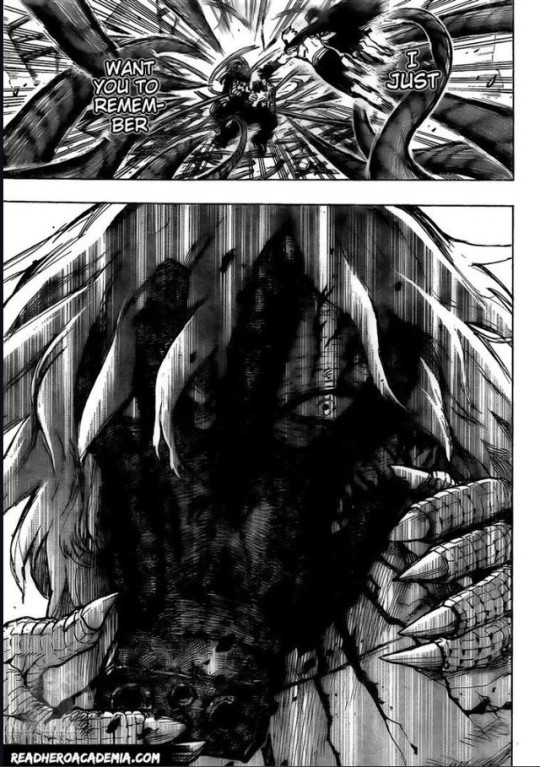
And after that the realization of Izuku, that Shigaraki, who he does want to save is not only suffering internally, but as well externally, because of AfO and whatever is going on. Exhausted beyong recognition.

Look at Shigaraki's form. He looks like he is right about to collapse. There is a hand stretched out, in help, in resignation, in sadness, in pain. But his other hand is almost clenching, hard, noy wanting to let go. Tomura is after all trying to fight the entity within him, while also trying not to lose himself and look out for everything that might come in its way outside.
And finally, there is someone who looks through the hand on his hand, through the cracks of his identity, through every wall Tomura has put in between himself and others in order to protect them, and himself, from the absolute monster he thinks he is.

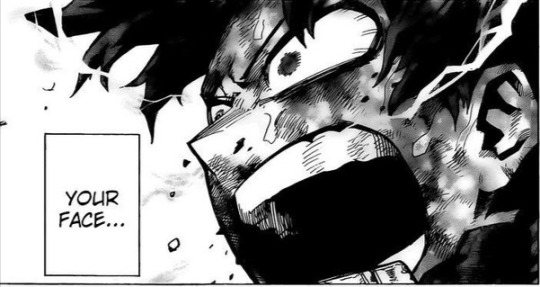
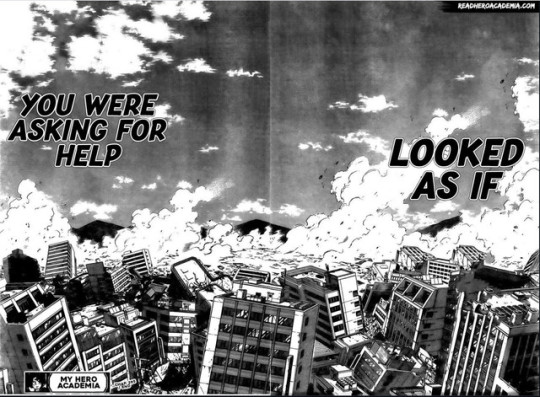
And it's, at the same time both ironic and daunting how these same words are also the works Deku speaks to Kacchan while saving him from the Sludge Villains. There is a direct parallel between Katsuki, who had hated Deku while being afraid of being inferior to him and that did not want his helo because he would feel too weak, and Shigaraki, who has no will of getting himself saved by anyone, but especially by the kid that denied him the objective of gaining OfA and defeating everything and the same kid who seems to feel something other than disgust for him. Both Katsuki and Shigaraki are opposites to Izuku.
So, if Izuku saved Kacchan, who in return saved Deku after accepting the fact that he and Izuku, are, after all, hero AND friends who care about each other, it would be nice to see where this is going to go with Tomura. And see if, maybe, just maybe, it is possible for Shigaraki to stop being Shigaraki and be Shimura Tenko instead.
#bnha#mha#my hero academy#bnha 300#bnha meta#bnha spoilers#mha 300#mha spoilers#shigaraki#shigaraki tomura#shigaraki survivalist#shigaraki supremacy#shimura tenko#lov#league of villains#boku no hero academia#sunn answers#bnha analysis#mha analysis#deku#izuku midoriya#hawks#todoroki family#Todoroki shouto#endeavour#all might#yagi toshinori#dabi#todoroki touya#bakugou katsuki
85 notes
·
View notes
Text
Series 15 gives all of the characters you could ever care about their worst possible endings, but presents these endings as somehow good or satisfying or acceptable. Here's a list.
The short version: they're Chuck's endings, and Chuck is a bad writer.
None of the characters can escape the fate set out for them or break the cycle of trauma begun by Chuck. The show itself doesn't even realise how truly awful these endings are - it dresses up a tragedy in pie gags and pretty colours and calls it a happy ending. And in order to inflict these worst possible endings on its characters, the narrative has to be twisted and contorted in the most absurd of ways.
So, onto the list:
Adam: Forgotten and left to languish in the pit, he's finally freed, only to suffer an anticlimactic offscreen death and be forgotten again. Michael, his only companion for so long, is also killed off. In the finale, blood family seems to be all that matters - and yet he isn't mentioned.
Alternate Kaia: She helps rescue Kaia from the Bad Place, but chooses to remain there to face certain destruction rather than return to earth with Kaia, Dean and Sam. This world is so hostile to her that death is preferable. Her horrible, pointless death stands as a powerful statement about the real harm caused by exclusion, but the text doesn't seem to acknowledge the full horror of this. Her death isn't remarked upon; it seems to suggest that both Kaia and her double are returned to their rightful places. It's just one example of the show creating awful endings without seeming to understand how awful they truly are. (I rant a lot more about Alternate Kaia here.)
Amara: After being betrayed and locked away for millennia, we see Amara's initial impulse for revenge and destruction transform into an admiration for creation. She becomes an advocate for humanity and the world. And yet she ends up being betrayed (by both the Winchesters and Chuck) and locked away again. She's absorbed by Chuck in a way that doesn't fit within the logic of the show. Chuck and Amara are equals - it doesn't make any sense that Chuck could overpower her. Wouldn't they become a blend of the two of them? And, since their separation caused the Big Bang, wouldn't their unity end the world? Anyway, having the cosmic feminine be voiceless and invisible is the worst way for Amara's story to end. Having Jack speak for her, saying that they are 'in harmony' tries to make this an acceptable fate for her, but only makes it worse.
Benny: Another offscreen death, and this one feels particularly spiteful. It really seems like he was killed just to be a conversation-starter for Cas and Dean. However, if his fate can be sealed by a line of dialogue, then it only proves that confirmation of the fates of Eileen, AU Charlie and the other hunters could have been given in the same way. Just one line could have done it - "I just spoke to Eileen, everyone's back." Instead, at the end of 15.19 we're in the absurd position of having Sam and Dean toast the people they've lost without them even bothering to check who that may or not be.
Billie: The bizarre thing about Billie being revealed as a villain at the end of Season 15 was that she was supposed to be acting in self-interest - that she wanted to be the new God. It made no sense. What would make sense to me, though, would be if Chuck was controlling her (as Lucifer bound Death in Season 5). Season 15 has strong echoes of Season 4 - and Billie took on both the role of Ruby (feeding Jack hearts rather than demon blood, but nevertheless making him into a weapon, with the price being the loss of his sense of self and ultimately his life) and Heaven (persuading Dean that it had to be this way, and telling him to go along with the plan). We only have the Shadow's word for Billie's motivation, and we know she wasn't responsible for the deaths of the AU hunters, so in the end her status is ambiguous - she really seems to be a victim of Chuck's bad writing. She's erased from the narrative along with Castiel, when really she should have been freed from Chuck's control and fighting on the side of nature and free will alongside the Winchesters. Supernatural also concludes with nobody in the role of Death, which is a crazy loose thread left dangling.
Castiel: His confession was a thing of beauty, perfectly summing up the truth of both his and Dean's characters. Both of them are made of and motivated by love. And yet after speaking his truth, he is silenced. He never gets to hear that he is loved in return (when the previous twelve seasons have made it abundantly clear to the audience that Dean loves Cas just as much as Cas loves Dean). His capacity for love made him the only thing that Chuck could not control; as an agent of free will, he should have had a central role in Chuck's defeat.
In 15x13, when Cas is in the Empty to see Ruby, the Shadow says: "funny thing about [Death's] plan, though... she didn't say anything about needing you. Baby, you can't just traipse in and out of here. It upsets the order of things." To me, this sounded so much like 4x22's "you're not in this story" that I saw it as a pretty clear indication that Cas would play an important part in Chuck's defeat. Because Team Free Will wouldn't follow the plan, would they? They would find another way, wouldn't they? Wouldn't they?
However, after the confession, he's never seen on screen again. He's barely mentioned. Eventually we're told he "helped" Jack, so he ends up where he started: as a servant of heaven. He deserved to complete his fall, to become human, to live as well as speak his truth. Making him a silent, unseen instrument of heaven undoes his entire arc. Erasing him from the narrative requires the extraordinary warping of that narrative: nothing about his death suggests that it should be accepted as a permanent 'sacrifice', when we know that there is a spell that can return angels from the Empty (and, thanks to the handprint, we have his blood for it) and that Lucifer was brought back by Chuck in 15x19. And the idea that Sam, Jack and Dean wouldn't try everything in their power to bring him back is utterly ludicrous.
Cas' confession scene to so closely mirrors 4x01's barn scene that the narrative is crying out for the parallel to be completed by Dean rescuing Cas from the Empty just as Cas rescued Dean from hell. However, we're never given that narrative closure - just like we are never given the reunions demanded by the scenes of Sam losing Eileen and Charlie losing Stevie.
Chuck: Okay, so he might not make your list of characters you could ever care about, but my point about his ending is that while it's fitting, for it to really work we also needed Cas to become human, too. For Chuck, being human is a punishment, but for Cas it would be a reward. We really needed this balance, otherwise all we have is humanity as the worst thing that could happen to you, which is not exactly a great parting message for the show. (Also, how precisely is it possible to make him human?) Not only is being human the worst fate possible, but, specifically, so is growing old and being forgotten. Again, this is a punishment for Chuck, but it would have been a reward for Dean: growing old when the story (and his own self-loathing) constantly told him that he would die young; and being forgotten, not in a negative sense, but in terms of not being a character in a story any more: remembered fondly by his friends but no longer a legend, just a man living an insignificant little life exactly the way he chooses.
Dean: Where do I even start. Let's be clear: ending the story with his death (by any means and in any scenario) was always going to be the absolute worst possible ending for him and for the show.
In 15x19 we have the glorious moment when Chuck calls him the ultimate killer, and Dean (heeding Cas' words from 15x18) says "that's not who I am". Now, I mean no disrespect to Dean here (because he is, canonically, a genius) but I don't think that he was in any way necessary to the Michael double-cross plot that eventually saw the defeat of Chuck. Honestly, if he had died in 15x18, then 15x19 could still have played out in exactly the same way. It's as if he wasn't saved so that he could save the world - he was saved so that he could have this moment of self-realisation. He was saved so that he could stand up to Chuck (God, and the author, and parallelled with John) and tell him that he's not the person that he tried to force him to be.
And yet by the next episode, this revelation is entirely forgotten. He doesn't get to continue his self-actualisation by speaking his truth to Cas. Instead, 15x20 presents Dean as almost a caricature of himself. Dean loves pie. Dean loves his brother. Dean loves his car. All of his complexity (present right from Season 1) is stripped away.
Finally free to write his own story, he ends up giving Chuck the ending he always wanted: one dead Winchester - killed, you could argue, by his brother (Sam fails to call for help and instead tells Dean to "go".) Told by Cas that he's not "Daddy's blunt instrument" and accepting that he's not "the ultimate killer", Dean goes right back to killing (even threatening torture) and following his father's words (in the form of the journal).
For Dean to die exactly as the story has always told him, and as he's always told himself in his worst moments of self loathing, is brutal and tragic. What makes it truly appalling is the way in which both Dean and Sam accept his death and say it's "okay". For Dean to say "always keep fighting" at the very moment when he gives up and when Sam gives up on him is bitterly ironic. (Interestingly, when Cas said "you have to keep fighting" in his 12x12 death speech, exhorting Sam and Dean to save themselves and leave him behind, Sam replied with "we are fighting. We're fighting for you, Cas" and Dean followed with "and like you said, you're family. And we don't leave family behind".)
Dean has always been the symbol of humanity in Supernatural: he stood for earth against the forces of heaven and hell. He'd rather live with pain and guilt than exist as a "Stepford bitch in paradise", and yet that's exactly what he becomes, driving mindlessly through Jack's new heaven where everyone is "happy". Dean previously dismissed heaven's happiness as "Memorex", and after Mary's death he was the only one not consoled by the confirmation that she was in heaven and happy. Having Dean being content in heaven is utterly out of character. He's always fought for free will, and in heaven - where there's no agency, where he's cut off from the world - this is the one thing that he does not have.
Eileen: An interesting, complex, kickass character, Eileen deserved so much better than being erased from the storyline. A Men of Letters legacy, I imagine her working with Sam to share the knowledge contained within the bunker whilst also dismantling the patriarchy, elitism and colonialism of its past. Her disappearance from the narrative makes absolutely no sense - 15x09, 15x17 and 15x18 confirm just how significant she is to Sam, and yet we never see them reunited or see Sam mourning her death. The audience's love for Eileen is totally disregarded, too - she's ripped away from us with no further explanation.
Emma: Okay, so she wasn't actually in season 15, but that's sort of my point. I have a lot to say about Emma, but here I'll just say that her significance has grown massively since Season 7. The narrative has shifted from Team Free Will being sons to being fathers. Even if she wasn't brought back, just a mention of her would have been significant. (I can't stop thinking about the massive potential of a conversation about Emma between Dean and Jack.) She didn't deserve to be forgotten.
Season 15 was Supernatural's last opportunity to bring back characters from the past - such as Meg, original Charlie, Crowley, and Bela Talbot - and give them better endings. Sadly this opportunity was wasted.
Garth: He actually seems to get his happy ending, on several levels. He finds a family; he finds happiness; he's acknowledged as a hero by the Winchesters, who had previously mocked him. Dean's words to him about embracing happiness are powerful. Garth lives as his full, authentic self - monstrosity now included. It's that monstrosity that's the issue here, though - as werewolves, Garth, Bess and little Sam and Castiel are doomed to go to purgatory when they die. Mia Vallens said to Jack that "it doesn't matter what you are - it matters what you do", but in this case the opposite is true. It's hideously unfair, but again the show never acknowledges this. It would have been simple to change in a line or two - just a quick mention about how purgatory has been fixed, so that only truly monstrous beasts like the leviathan are kept trapped there - but the injustice remains.
Jack: From his birth, his destiny was either to be the monstrous destroyer or the divine saviour of the world, which is precisely why he should have side-stepped it and found another way. He deserved to live without the weight of the world on his shoulders. Instead, he was forced to take on the power of God - and since when has someone suddenly taking on a huge amount of power ever ended well for Team Free Will? Then, he repeats the exact same pattern set up by Chuck. First, he abandons his creation by walking away and disappearing off to, in the words of Bobby, "wherever he went". Like Chuck, he ignores earthly suffering: if he's now omniscient and omnipotent, is he in fact complicit in Dean's death? Secondly, he's controlling: he remodels Heaven as he sees fit, making it a place where everyone's together and everyone's happy, with its inhabitants given absolutely no choice in the matter. There's also no reason why Jack had to vanish from the story - Chuck was capable of spending time on Earth.
The mechanics of the bomb plot also irks me no end. We're told by Death that the bomb will kill Jack. However, their plan fails, and Jack survives the blast. In 15x19, Dean tells Chuck that all the work done to turn Jack into a "cosmic bomb" has turned him instead into a "power vacuum." It makes it seem like a side-effect, and also that "sucking up bits of power" has been charging him up to the point where he's "unstoppable". He's able to both absorb and appropriate Chuck's power. However, in 15x17 Adam and Serafina explain that the bomb will create a "metaphysical supernova" that will make Jack into "a living black hole for divine energy" - which suggests that, actually, the bomb worked as intended.
But if the plan worked, why is Jack still alive? Billie made it clear that Jack wouldn't survive. And "nothing can escape" a black hole - so how is Jack able to use Chuck's powers to bring back Earth's population? Besides which, didn't 15x17 reveal that Chuck himself had "orchestrated" the entire thing? Which makes the theory that Chuck possessed Jack really the only outcome that makes sense. (Particularly as Serafina talks about Jack making his "vessel" strong. Jack is a nephil, not an angel - he has a body, not a vessel. Also, the bomb is made by fusing his soul with his grace - so, the two things that make up Jack, his humanity and his divinity, are annihilated.) Deliberately making Chuck win, however (with no tease at the end that this might be the case), makes no sense either. My head hurts.
Kevin: As if he hadn't been treated badly enough by the story already, we find that Kevin hasn't been in Heaven since we last saw him, but rather hell. He ends up as an untethered ghost, presumably just wandering about for all eternity. His fate comes courtesy of a bizarre new rule that souls from hell can't go to heaven - when previously both Bobby and John have done exactly that. Again, just one line telling us that he's now in heaven could have changed his ending.
Michael: Bringing back Adam and Michael was a brilliant move, and this version of Michael was utterly compelling - struggling with his faith in his father after being abandoned, torn between his loyalty to Heaven and his relationship with Adam. I thought that his handing over of the spell was very similar to Cas' "just so you understand … why I can't help" moment, and it seemed the precursor to Michael becoming an advocate for humanity, even a member of Team Free Will. However, instead Michael was doomed to play out his father's narrative: killing his brother and repeating the cycle of sibling conflict and trauma that Chuck began when he betrayed Amara. (And we'll credit Chuck's bad writing with the fact that the battle between Michael and Lucifer that was once predicted to wipe out millions and scorch the globe can now happen in the bunker without so much as a chair being knocked over - and without wires as well.)
Rowena: She seems to be relishing her reign as Queen of Hell, but the way she's so casually condemned is jarring. Surely her previous good deeds and her final act of self sacrifice would be enough to tip the scales in a heavenly direction? (It worked for Lily Sunder - another woman who vowed never to be powerless again.) They could easily have said it was Chuck's fault that she had to remain in hell - but instead it just seems like a foregone conclusion. She deserved better.
Sam: If we're supposed to believe that having a "normal" life is Sam's idea of writing his own story, why doesn't he do it as soon as Chuck is defeated? Instead, his suburban "apple pie" life only happens after Dean dies, which makes it seem more of a grief arc than a happy ending. (Just as he escaped into a self-professed "fantasy" life with Amelia after Dean's death, or when he succumbed to the comfort of a fake married life in Charming Acres after the trauma of losing all the AU hunters).
The idea that he'd keep hunting for Dean doesn't ring true - Dean had been the one openly craving retirement and domesticity for several seasons. After all, the idea of Dean as a hunter and Sam as the brother who wants to be normal is Chuck's story. Dean wasn't the "ultimate killer" that Chuck wanted him to be, and Sam too had been forging his own identity as a leader, a Man of Letters, and a powerful witch. He'd also found love - and with Eileen, he could be his full, authentic self. The idea that he would leave her is absurd, as is the idea that he would abandon his entire extended found family, who seem to have no part in his new life. When Dean returned from purgatory, he was furious that Sam had failed to help Kevin. Would Sam really do the exact same thing again - walk away from Jody and the girls when they are mourning both Cas and Dean and need his support? Would he just abandon Rowena's entire witchy collection and leave the huge store of knowledge in the Bunker locked up in the dark?
The Shadow: again, dubious on a list of characters you care about, but hey - all they ever really wanted was to go back to sleep, and can't we all relate to that? Anyway, they made the list for being one of the most frustrating open endings of the show. What did it mean for the Empty to be "loud"? Who is the Shadow, anyway? Just how did this cosmic entity fit in with the mythology of Chuck and Amara? It's maddening that the Shadow and the Empty were made central to several seasons only to be suddenly dropped.
The Wayward Sisters: my beloveds. Such a brilliant cast of characters and such wasted potential. They're an important part of the Winchesters' family and Team Free Will, but, in the end, they're forgotten. Claire may have gotten her happy ending with the return of Kaia, but this happens off screen. We never see her reaction to the deaths of Castiel or Dean.
The final few episodes seem to be about stripping away all of the characters except Sam and Dean, so they are completely alone by 15x20. Phrases such as "just us" and "just you and me" and "it's always been you and me" seem to suggest that this is a good thing, but previously the idea of them being isolated and alone has seemed like the worst case scenario (for example in Season 8, when Sam and Dean are forced to give up Amelia and Benny, respectively, or in Chuck's vision of a future in which the brothers lose Eileen and Cas along with Jody and the girls, give up hope, and end up as vampires, killed by their remaining friends).
Anyway, the whole idea of just Sam and Dean going wherever the road takes them is Chuck's story. It's on the cover of his books. By making Chuck the villain, Season 15 itself makes it impossible for a return to this idea to be a satisfying conclusion to the story.
In fact, Supernatural was never about just Sam and Dean. It was always about family. Season 1 was about Sam, Dean and John. Bobby introduced the phrase "family don't end with blood" in Season 3 and Dean coined the phrase "Team Free Will" in Season 4. It's an ethos that has spread into the fandom, too. Didn't the SPN Family deserve a finale that celebrated that idea, of banding together, of caring about the whole world, of love being the ultimate expression of free will?
You can't help but pick up on a theme: characters that were forgotten are forgotten again. Characters who were locked away are locked away again. The same narratives and the same traumas play out again and again. No-one escapes their miserable, predestined fate. It's Chuck's ending. And it's Chuck's spiteful ending.
It's the ending that kills off its beloved characters, and also destroys their whole world. The bunker is left in darkness. Time has moved forward by so much in order to accommodate Sam's natural death that we can't even imagine the ongoing stories of other characters like Garth or the Sioux Falls family (ironic, given the episode's title).
It's the kind of ending you get when a show is cancelled and the writer decides to kill off their characters and wreck their world so that there's no possibility of another network or another writer taking over their story. (And yet outside of the show, there's no evidence to suggest this - you would think that the ending had been designed to make a reboot impossible, but it has already been talked about.)
If we were not going to get a sense of the world continuing, then we could have been given a more radical and satisfying ending. We could have had Death collect on their promise to one day reap God. We could have had a world freed from the supernatural entirely: heaven, hell and purgatory obliterated, and Team Free Will finding peace in life on earth.
Because Chuck has been the author and the narrator the entire time, it makes no sense for the story to continue past the point of his defeat. (It makes even less sense for that story to revert back to Chuck's ideal narrative.) So, really we should have been given a more open ending: Team Free Will triumphant over Chuck and their future left open, the author dead and the characters' stories entrusted to the audience.
Instead, in the end, it's a bizarre mix of needlessly closed-down endings (killing off Cas, Sam and Dean, and vanishing Jack) and frustrating open ones (the loud Empty, there being no Death, Kevin wandering, the ambiguous fate of Eileen, Adam, Donna and the AU hunters).
And the final two episodes are also objectively bad. The double-cross plot in 15x19 is lame when the resolution of the Chuck storyline should have been profound. (It invites comparisons with the Season 11 finale, which was excellent.) 15x20 feels weirdly empty and flat. Dean's death is unrealistic; it echoes Sam's death in Season 2 and Dean's in Season 9 (which, if you think about it, would only be possible if Chuck was still writing it), but lacks the emotional punch of either. Dean's "I'm proud of us," in his Season 9 death scene is so much more powerful than his "I'm proud of you" in the finale. And let's not even mention that wig.
In conclusion: every single character deserved better. The actors deserved better. The audience deserved better. Because the ending we were given was not the ending that the season, or the entire series, had been building towards.
The ending tries to destroy every good thing that Supernatural has ever given us - vibrant characters, the fight for free will, the value of found family, the power of love - but it fails. Ultimately the characters and themes are too powerful to be contained by that terrible, flimsy ending. So now I've gotten all of that off my chest, I'm going right back to finale denialism.
#so I've been compiling this list for quite a while and now seems as good a time as any to get it off my chest#it's also the checklist for the fix-it I'm writing so really I should go and work on that#supernatural#spn#spn 15x20#spn 15.20#tw dean's death
31 notes
·
View notes
Text

AND WE ARE BACK!
Part two of the Schitt’s Creek Community Fic Rec is here! This time, we focused on celebrating our favorite AU’s! Once again, this is dedicated with love to the the authors of this community! Every participant chose one AU (which was a little hard to do for some) to share and why they enjoyed it.
Thank you to everyone who submitted!
@bestwisheswarmestregards // @brighter-than-sunshine // @danieljradcliffe // @devilstelephone // @fishyspots // @imargaery // @justwaiting23 // @patrickbrewsky // @rockinhamburger // @roguebabyinyourstore // @rosebuddsmotel // @stuck-on-your-heart // @the-13th-wheel // @thedidipickles // @thisbuildinghasfeelings // @yourbuttervoicedbeau
And a very special thank you to anyone who has ever written anything in this community!
Everything is posted below the cut, and you can check out part one here!
**As always, if I missed an author’s tumblr handle, please let me know!
@bestwisheswarmestregards
Odd Man Rush by @samwhambam
It’s David and Patrick and Hockey! Three of my favorite things! Also the ending is one of my favorite endings. It’s so sweet! It’s part of the series score and all of the stories are so cute but this one is my favorite!
@brighter-than-sunshine
Thanks For Choosing Bagged! by dinnfameron
I love this one because the dialogue is so adorable, and true to David and Patrick! I can totally see the characters getting involved in something like this, like a different version of a rom-com.
@danieljradcliffe
Going Down by concannonfodder
This is one of the best stories of NYC!David and recently out Patrick while they're both trying to find themselves. It's beautifully written and my favourite part is that each chapter switches between David and Patrick's POV. It does a great job of highlighting the aspects of their personalities that we know and love but shows them to us in a new light.
@devilstelephone
sustineo by @rockinhamburger
The contemporary art discussions between Patrick and David are interesting and important to the story. Patrick still cares for and emotionally connects with David In a world that is so different than Schitt’s Creek. I liked that Sebastian Raine was the evil force without being included as a character.
@fishyspots
Welcome to Cabaret by @vivianblakesunrisebay
It's lovely from start to finish! In this 'verse, Christmas World didn't pull out, so David didn't get the lease for the general store. Instead, he gets roped into helping Moira with Cabaret, and meets Patrick (kind of) through that. I love the way this author writes. The dialogue is in-character, and the plot is wonderful and pulls out moments from canon and reimagines them in some truly inspired ways. I'm such a fan of all of this author's works; this was the first one I read, and it remains my favorite.
@imargaery
David.; or, a Tale of Misapplied Sense by Siria
A Jane Austen D&P AU and it is BRILLIANT. If you're an Austen fan, you will be able to immediately pick up on how well this author adapted Austen's style, wit, character descriptions, and ability to whack you over the head with romance when you're not even ready for it yet. Siria is a very experienced fanfic writer, but writes for many fandoms, so I think that's maybe why it doesn't have that many hits? I'm so glad I clicked on it. I want to wrap myself up in this story. I want to make a podfic out of it. I want to put it on a t-shirt and wear it every day. Also, it's in a regency AU where homophobia isn't a thing, so you don't even have to worry about that. I want to tell you more, but that would spoil it. Just read the damn thing and thank me later.
@justwaiting23
You Were the Ocean, I Was Just a Stone by @al-ex-an-d-er-hamiltons
The image of a curly haired fisherman Patrick is enough but this whole fic is such a sweet concept. Their interactions in this are so reminiscent of the show but also so different because they already know each other vaguely, and I come back to this fic over and over just because it's the perfect mix of angsty miscommunication and fluff.
@maxbegone
Known and Be Known by ahurston
As someone who tends to lean toward canon/canon-divergent stories, this was a refreshing take on an AU. Beautifully written and wonderfully raw, ahurston conveyed the vulnerabilities between both David and Patrick so wonderfully. “The mortifying ordeal of being known,” personified in fanfiction format. With humor and some wonderfully hot scenes peppered throughout, this fic was just brilliant from start to finish. I love when authors explore Patrick's insecurities and vulnerabilities - they aren't written about as often as David's are. I implore you to read this, if you're able.
@patrickbrewsky
Bound by Symmetry by barelypink
They say write what you know. I instead read what I know. David is the accidentally fantastic teacher we all wished we'd had in high school, and some of us wish/hope we are or might be one day. This fic is a great exploration of combining everything David knows he is (creative, bright, v.knowledgeable about art) and all the things he thinks he's not (empathetic, a role model, great with kids, selfless, kind, & big hearted) The selling point quote: "And it feels good, David realizes, to have a job that means something, a purpose beyond himself. A place where he feels like he belongs, just like his students." (David Rose proves he is both a good and nice person).
@rockinhamburger
Blackbird, Fly by distractivate
This is a post-apocalyptic story about love, connection, and hope, with a central theme of growth from destruction. I could not put this one down; I read it feverishly in one sitting, desperate to soak up every word. I love this fic because it is what I like to think of as an exemplar for transformative works (one of ao3’s top values). I love the way the fic stretches toward the light in the dark. It makes me think: about the quintessential elements of these characters, what remains the same despite changed circumstance, and what inevitably shifts when these characters we know and love are faced with a situation far outside their experience or comfort. This story likely hits differently in 2020, when post-apocalyptic narratives feel much less distant than they might have just a year ago. And yet, all the more reason to read an incredible work about hope and resilience and transformation.
@roguebabyinyourstore
Fifteen Hundred Miles by MoreHuman
Where do I even begin with this fic? I was at first skeptical about what reason David Rose would have to willingly subject himself to a trek through the wilderness out of his own volition. Well I’m so glad I ignored that admittedly stupid part of me because this is one of the mostly beautifully crafted stories I have ever read. Patrick and David are individually on their own journeys of self-discovery, but the way they help each other find what they sought... It’s breathtaking. Their feelings for each other bloom so organically over their time together that despite the circumstances laid out before them, the miles that they stumble and walk and run bring them miles closer to each other. Closer to the love that they both didn’t know they needed. The characters come alive and are identical to their canon selves. The dialogue and banter are spot on David and Patrick. The writing itself is superb. The tropes are incredible, the pining and *oh no there’s only one tent.* The slow burn is tantalizing but in a way that feels true to a genuine love story. The way the setting somehow breathes in tune with the characters, the way they leave messages behind in the trail register—conveying more than they can utter aloud— and the way their families communicate with them throughout their time on the trail through letters. All of the elements of this story ground it in universal truth, in feelings that are not only relatable, believable but demand to be felt. I can wax poetic until I am blue in the face, but really... Read this story. And then reread it a million times.
@rosebuddsmotel
I Carry These Heart-Shapes Only to You by @ladyflowdi and @ships-to-sail
There are over 180,000 words in this WWII AU, but not one of those words is wasted. It is gorgeous in its prose, and incredibly romantic without romanticizing the very real pain and tragedies of the era in which it exists. It's not an easy read by any means, but it's the kind of cathartic emotional journey that is more than worth it in the end.
@stuck-on-your-heart
kiss from a rose by mihaly ( @davidroseshusband )
What can I say about this very special fic that would do it justice? In this story, Alexis stars in a Bachelorette-style dating show and it’s every bit as brilliant as it sounds. On top of the incredible characterization, there are little surprises at every turn, there’s pining, and of course, there’s love. Secret love, even. This fic is truly addicting – I promise you won’t be able to stop once you start reading, and it will leave you feeling so satisfied (and if you’re like me, a little misty)!!!
@the-13th-wheel
Hold Me Like You’ll Never Let Me Go by @mooodlighting
It is a wonderful short AU where Patrick and David where they meet at an airport after they get snowed in. It is cute, there is longing and pining that just make it a wonderful read!
@thedidipickles
Beneath the Winter Snow by Distractivate
The writing is so utterly gorgeous all the way throughout that I frequently needed to take breaks to breathe. The author *perfectly* builds an Olympic world that I can totally see my favorite characters inhabiting, and the resolution is gorgeous. All of Distractivate's AUs are amazing, but this one still stands out.
@thisbuildinghasfeelings
How Do We Get Back by @unfolded73
This one deals with a literal alternate universe, which is the first thing I loved about it because I had never read a fic quite like it before. It's a beautifully written 60,000+ word masterpiece that definitely makes me feel ALL the feelings. In addition, it is absolutely riveting. I could not stop reading until I got to the end.
@yourbuttervoicedbeau
Make It To Me by figmentof ( @rosesdavid )
Epistolatory fic is SO hard to pull off and the author does such an incredible job with the way the characters shine through even though we only see them interact via text message. This fic is my comfort food and I reread it regularly <3
Anonymous Recs:
Just Breathe by olivebranchesandredwine
I love this one because it's got Patrick as a yoga teacher (hot!) and shows David being proactive about anxiety and it's just such a lovely story.
Shall I Stay? by alladaydream ( @maybewecandreamalittle )
This is so worth the 100k wordcount. 18-year-old David and Patrick sweetly leaning into first love, a lot of angst and pining in the middle that allow them both to heal and grow, and a heartfelt reconciliation. Plus, two bonus cherries on top with artist!David and a beautiful epilogue in which they (spoiler) live happily ever after. The tone and pacing of this fic is so good, and I always go back to it when I want to read something comforting.
Your Heart is Keeping Time with Me by @yourbuttervoicedbeau
I haven't seen 50 First Dates, but this fic is better than the movie could ever be. The author's writing is so beautiful and her David who has amnesia and her Patrick who wants to help him are just PERFECT. I want more and more and more of this.
Once again, thank you to everyone who participated and thank you to every single person who has written something in this community! It would be wonderful to do a part three, but for now, enjoy some alternate universe fics!
#schitt's creek#schitts creek#sc community fic rec#sc fic rec#sc fic recs#schitt's creek fic#schitt's creek fics#david rose#patrick brewer#david x patrick#bestwisheswarmestregards#brighter-than-sunshine#danieljradcliffe#fishyspots#devilstelephone#imargaery#justwaiting23#patrickbrewsky#rockinhamburger#roguebabyinyourstore#rosebuddsmotel#stuck-on-your-heart#the-13th-wheel#thedidipickles#thisbuildinghasfeelings#yourbuttervoicedbeau
147 notes
·
View notes
Note
Ah, but what scenes in particular did you enjoy? The wangxian ones in general? Or were there any particular ones that stuck with you?
-the axe cultivator
Oh, ac, I missed some of your question last time didn't I? So sorry. My head is kinda in the clouds these days
There are so many scenes that stuck with me, so I'll make a bullet list and probably still miss some ^^
It's such a small thing but in ep 1 the transition from the tale of how wei wuxian was killed transitions to the tea house via a shit from within sizhui's trea cup as he's pouring tea "onto the camera". It's nothing special but remember loving that shot so much the first time I watched that it was one of the things that kept me watching
Wangxian-wise in the first two episodes, I'd be remiss not to mention that handgrip when wei wuxian plays wangxian to calm wen ning down. Because it goes on ... and on ... and on. When I watched it for the first time I was like "ooohhhh so it's gonna be this kind of gay". You know the endless-longing-stares kind. And now when I rewatch it's just devastating. The last time they saw each other before this scene, they also held onto each others wrists but wei wuxian let go and fell to his death. And here lan zhan is, holding on for minutes and only let's go once jiang cheng threatens wei wuxian. Just ... 💔
i started shipping xiyao from their very furst sxebe together. Those two actors (i try to remeber their names but i always forget them again. My memory is shit when it comes to names :/) really just did want some of that sweet sweet homoerotic tension. Also, their first interaction stand out to me as the moment i really started to like lan xichen. In a setting that was shown early on to be highly hierarchical, he exhibited in the very forst scenes that he is willing to disregard someone's standing and look at their character and abilities instead. I just really love xichen ❤
Okay, i can't name one scene per episode, so let’s sum them up a little
I adore this progression during the cloud recesses and the yin iron arc from a flirtratious rivalry to genuine deep freindship and love. There are so many little moments that stand out because of the subtle acting joices made my wang yibo and xiao zhan, as well as the script, The lantern scene, when Wei Wuxian doesn’t betray the yin iron secret to huaisang and lan wangji goes “hu, so your bullshitting has reasons”, when they are in the market and lan zhan actually communicates that he doesn’t like crowds and wei wuxian pulls him closer but not into the crowd and so many others. When you watch closely, you see them realising little details about each other and I’m honestly so impressed with how amazingly the process of their falling in love was portrayed
fast forward a bit: obviously, the freaking montage quasi-fan vid in the middle of the cave scene set to their freaking love song. I remeber when I first watched this scene I actually, literally screamed. I could not believe it because their was no fucking way that this could be read as anything but romantic and I was not used to that much blatant queer romance!
A little less happy (okay a lot). The entire destruction of the jiang clan with a special mention to the scene when Jiang Cheng and Wei Wuxian just saw the bodies and run into fields where they fight and Jiang Cheng chokes Wei Wuxian and then they just fall back in exhaustion and sleep right there under the open sky. Everything about that scene was brilliantly done and also soul-crushing. The loss of innosence in that moment devastated me. It was so obvious that in the moment of deepest despair, all of these children’s traumas and deep-seated fears reared their ugly heads. So Jiang Cheng directs all his grief at the easiest target for his anger and Wei Wuxian just takes it because that is what he thinks is his job. And the real tragedy? This dynamic will not be broken until Wei Wuxian’s literal death. These children need therapy so goddamn badly and all they get is more trauma on top of their excisting trauma.
“The single log bridge” scene. I. Am. A. Sucker for the found family trope, especially for characters who cronically think they have to do everything on their own. So there Wei Wuxian is saying he will walk his dark path alone, but instead he finds lit lanterns and a humble feast prepared for him by people who love him. That juxtaposition kils. me. every. time. YOU ARE LOVED WEI WUXIAN! FOR YOURSELF!
(Shout out to the second time his word are refuted, this time by lan wangji and *gasp* verbally. Because there is NO better love declaration than that scene in front of basically every leader of cultivation world who politely wait for their turn to attack them)
Luo Qingyang removing herself from the narrative. I literally cry every time.
Talking about women: jiang yanli defending wei wuxian and calling him her brother. That moment is the "three things all wise men fear" quite incarnat, only it's the anger of a gentle woman
“Let me go” So ... I have SUCH a thing for couple who grapple with questions of when it is time to let go and when it is time to hold on. So Wangxian hits all my buttons. I will go further into this in my last bullet point (about the very last scene)
Oh god, this list is gonna get so long and i’m still going to forget things
In the present timeline:
Again, to sum it up, all the gentle wangxian moment where they look at each other and their entire face grows soft. Every almost-smile lan wangji sends wei wuxian, every "oh. He really loves me huh?"-look from wei wuxian. Especially in the Jingshi just after lan Xichen's loredrop. These two intensly guarded people (yes, wei wuxian is guarded,he just hides behind smiles) are so open with each other. I only have to see a guf of lan wangji with his heir down and I go feral!
Talking about that episode, the lan family backstory as a scene does things to me. And I remember watching that the first time and so much of lan wangji's behaviour suddenly making sense. Especially little lan zhan kneeling in front of his mother’s house and that being how he showed his grief really drove home just how this man exhibits emotion. I'm pretty sure that that was the moment he really became my favourite character.
Same episode and a start juxtaposition to the domestic scene between wangxian before: the talk between lan xichen and Jin Guangyao just afterwards. You could probably write an essay of meta about the parallels and differences between those two scenes and I think that's deliberate because they're back to back. The lan brother's share tea with the person closest to their hearts. One is finally able to open himself fully, the other closes up more than he ever has before with this person. The framing in that scene alone drives that message home, never mind its content. It's heart-wrenching and so well done!
Talking about xiyao: jin guangyao's death for similar reasons. Just ... arrrgh
I'm sure I've missed a ton but thus is already so long so I'll close with my favourite overall: the last scene. The parting and subsequent reunion on the mountaintop. I've stated before why this means so much to me. It is such a reassuring message to me: to have two intensely different people learn to understand and love each other exactly as they are. Being who they are, the occasionally walk different paths. But they don't limit each other. They learn to improve each other by just being there when they are and therefore know and trust that their love will return.
This was mostly cql because you asked for "scenes", but have some honorary novel mentions:
Lan Wangji: "The face says nothing. Listen to the heart-beat." 😭😭😭
The moment when wei wuxian collapses after the second siege and lan sizhui expresses surprise over this, lan wangji says something like "We are all human." I love that moment for many reasons. 1) it's one of the rare direct insights into lan wangji's thoughts. No matter how brief he is here, you don't say something like that just because. 2) and it's significant that he is the one saying it because he, too, is placed on a pedestal. In fact, I think a lot about mdzs boils down to the conflict between the inner self and outer perception and how that dichotomy can be both a deliberate shield (lan zhan being the perfect example) and a curse
I hope you and your axe are having a wonderful day 🥰
#mdzsnetcc#ask#ask game#the untamed#cql#mdzs#lan wangji#wei wuxian#lan xichen#jin guangyao#wangxian#xiyao
20 notes
·
View notes
Text
Jaime Lannister and John Silver: of arcs and endings
Or, herein follows a possibly niche comparison between the character arcs of Jaime Lannister (Game of Thrones, HBO, 2011-2019) and John Silver (Black Sails, Starz, 2014-2017), in which I will argue that Jaime’s character arc fails not because of Jaime’s actions, but because of the way his story is framed to the viewer throughout the series, using Silver as a springboard to explore the requisites for a tragic yet satisfying ending.
(Yes, this is 5K words long. No, I am not sorry. Spoilers for Jaime’s and Silver’s storylines in their respective shows, and while I’ve tried to stay vague about the Bigger Picture, read at your own risk.)
Okay, so. I was, and still am, to an extent, a huge Game of Thrones fan. I’ve pored over the books, been to conventions, and spent a good couple of years while I was at uni discussing fan theories on message boards into the early hours of the morning. Jaime Lannister has been one of my favourite fictional characters for over a decade. Yet I certainly wasn’t alone in watching in horror as years of hopeful build up was thrown away in the span of one and a half episodes during the final season of the show. There are *many* things that hurt about season 8 of Game of Thrones. But the swift 180 we see in Jaime, from aiding the Starks in the Battle of Winterfell and finally choosing Brienne, to abandoning her to return to Cersei 20 minutes later, was, for me, one of the deepest cuts.
When I started watching Black Sails this August, I was immediately compelled by Silver – unsurprisingly, as someone who has exactly one favourite character type: Traumatised and Morally Grey Anti-Villain. Watching Silver’s character develop over the four seasons of Black Sails was an absolute joy, and his ending in the finale, though *incredibly difficult*, was nuanced and in character and satisfying. (Am going to try and keep as vague as possible on details here, because Black Sails is an incredible show that more people should watch and I don’t want to completely spoil the ending). Silver and Jaime are two characters with a lot of similarities and their characters arcs appear to run in direct parallel with each other: both selfish and arrogant men who become more empathetic and invested in others as the series progresses, in large part prompted by the loss of a limb. However, the gulf in reception of their overall arcs can be pinpointed to one huge disparity between the way both storylines were framed to the audience, and that is difference between redemption and tragedy.
“I was that hand”
But first! Let’s start with the more obvious stuff.
When we meet Jaime Lannister and John Silver in the pilots of their respective shows, they are both introduced as arrogant and self-serving – yet charming – men, who place the needs of themselves (and Cersei, in Jaime’s case) above all else. Silver kills and impersonates the cook on the merchant ship Flint’s crew captures, and has no qualms about lying his way onto the crew whilst simultaneously planning to sell the Urca schedule to the highest bidder. For Silver, his own survival comes before any sense of moral code. We are told stories about Jaime before we properly meet him – that he killed the previous king, Aerys Targaryen, that he has no honour – but nothing that we see first-hand contradicts this; at the end of the pilot he attempts to kill a child to cover up his and Cersei’s incestuous relationship. Silver is certainly supposed to be more likeable than Jaime, but both men, despite their lack of morals, are presented as charming, clever, and good with a one-liner. As we move through the early seasons of both shows, they are consistent in these traits, although Jaime is presented as an outright antagonist whereas Silver from the outset is a morally grey unknown entity, keeping viewers on our toes wondering if he’ll turn against Flint, against Billy, against Eleanor. Things change, for both men, however, with the direct lead up and fallout of the loss of a limb: Jaime’s hand and Silver’s leg.
The introduction of Brienne of Tarth as Jaime’s foil kickstarts his path towards becoming the honourable man he once dreamed of being. During their roadtrip across Westeros, she challenges him and is able to get under his skin in a way we haven’t yet seen before. This comes to a head when the duo are captured, and Jaime intervenes during her attempted rape, lying about her ransom worth and saving her from an awful fate. The result? The immediate amputation of Jaime’s sword hand, representative of Jaime’s identity (“I was that hand”). Jaime is punished for the first selfless act we see him commit on the show with the loss of the source of his power and self-worth.
Silver, in a similar fashion, finds himself in a position to save the crew he has spent two seasons disparaging. When he is offered the opportunity to betray his crew for an escape route, he refuses (the reasons for this refusal never outright stated, although I imagine Flint’s “where else will you wake up in the morning and matter” and Billy’s “that’s our brother you’ve got there” both factor heavily). Again, the result of this refusal is the brutal torture and eventual amputation of Silver’s leg – a man who in his own words is “not a joiner”, prone to taking what he needs and leaving, to reinventing himself, to always having an escape route. As actor Luke Arnold says: “He's a guy who's always had one leg out the door, and then they cut it off.”
What is interesting here is not only that we have two characters who are *punished* for moving beyond their selfishness, but that that punishment is specifically catered towards their defining characteristics. Jaime is left unable to fight, unable to defend himself, unable to uphold his reputation. Silver is left unable to run, unable to leave his past behind him, unable to remain without attachments. Both are left vulnerable. The loss of Jaime’s hand forces him to reinvent himself in a world ruled by swords; as Lord Commander of the Kingsguard, father to Tommen, and an honourable man working to uphold his oath, through Brienne, to Catelyn Stark. The loss of Silver’s leg, however, leaves him *unable* to reinvent himself; forcing him to rely on his crew and paving the way for the growth of his relationship with Flint and Madi. In losing their limbs both Jaime and Silver are set on paths towards gaining empathy, and are able to become invested in those around them.
“Defined by their histories, distorted to fit their narratives”
Game of Thrones and Black Sails both engage heavily with ideas of myth-making and storytelling. Stories are woven into the mythology of Westeros; a world with thousands of years of history revealed to us slowly over the seasons to suit the narrative and the teller. We are told the story of Rhaegar Targaryen’s kidnap and rape of Lyanna Stark in the pilot, and at first this serves to provide a tragic landscape for Robert’s unhealthy relationship with his wife and his crown. It is only as the show develops and we hear more about Rhaegar and Lyanna that we realise there is more to this story; in season 5 Littlefinger recounts the events of the Tourney of Harrenhal to foreshadow the reveal of Jon’s parentage later that season, that Rhaegar and Lyanna had a happy and consensual relationship and that it is Robert who could be viewed as the villain of this sequence. We are taught through watching the show to never assume that any given story is true. Black Sails similarly plays with the idea of the power of the storyteller, combining historical pirates with fictional pirates and an origin story for Treasure Island, and going to great lengths to show that history is in the hands of the victor. Most of the primary sources of pirate history are from the perspective of civilised England, and in the process of watching the show we come to realise the bias inherent in these histories; much like in Game of Thrones, they are stories, and should not be assumed to be either true or accurate. As Jack says in the finale: “a story is true, a story is untrue […] The stories we want to believe, those are the ones that survive”.
Jaime Lannister and John Silver are both characters defined by stories that are forced upon them without choice: the Kingslayer and Long John Silver. We meet Jaime as the Kingslayer; our opinion of him is immediately formed by the story of him stabbing in the back the King he had sworn to protect, and cemented by the fact that our protagonist, Ned Stark, a man we like and trust, is the one telling this story. The Kingslayer’s presence is so strong in the first two seasons of the show that Jaime becomes nameless, reduced to this one defining act. It is only after the loss of his hand, and through his developing bond with Brienne, that he is finally able to tell his own story and we realise our entire perception of Jaime’s character has been based on an incorrect interpretation of events: that in killing Aerys Targaryen Jaime was saving the population of Kings Landing from destruction via wildfire. It is only after the truth of this story has been revealed to us that Jaime is able to begin moving past the Kingslayer and forging a new identity.
We see this in reverse in Black Sails, for the story of Long John Silver is not introduced until the season 3 finale, but like Jaime, this story is not told by Silver. Billy creates the myth of Long John, commits the acts attributed to him, and uses him as a figurehead for the pirate rebellion all without Silver’s knowledge or consent. Season 4 sees Silver wrestle with this identity of King of the Pirates, surrounded by people who want to use ‘Long John Silver’ for their own benefit: Billy, Israel Hands, even Flint. As the power and influence of Long John Silver the story grows, John Silver the man is disregarded, and his value reduced to how he can further everyone else’s individual causes. Though he does embrace this title (for a time, at least) to further “Flint and Madi’s war”, a cause he doesn’t truly believe in beyond his investment in Flint and Madi as people, we come to realise that the ‘character’ of Long John Silver that we know from Treasure Island is only that: a character, a story, a collective created for a larger cause that Silver himself eventually betrays.
I have seen some criticism of this scene, but for me one of the few redeeming moments of the Game of Thrones finale was Brienne writing Jaime’s story in the Book of White. Despite Jaime’s less than satisfactory conclusion, with this act he is finally able to move past the Kingslayer; Brienne has rewritten his narrative, and he will be remembered as a Knight who “died protecting his Queen”. Silver is offered no such release. By contrast, the story of Long John Silver is all that will be remembered; the worst fear for a man who cannot bear for his own story to be known. Indeed, we learn that “those who stood to benefit most from [Long John Silver] were the most eager to leave it all behind”. While Jaime is able to escape the story of the Kingslayer, the story of Long John Silver is what will endure, “all that is left of [him] is the monster in the story they tell their children”. Hello Treasure Island.
“Reviled by so many for my finest act"
We can see here that Jaime and Silver’s narratives deal with similar themes, but often in contrasting ways. Just as with storytelling, Jaime and Silver’s backstories are key parts of their storylines in their respective shows, but operate with very different functions. (It is only as I am writing this that I’m realising how similar the themes of Game of Thrones and Black Sails actually are? If only Game of Thrones had the follow through of Black Sails... We were all rooting for you, etc etc).
Jaime’s backstory, and the truth of the act that earned him the title ‘Kingslayer’, is revealed to us mid-way through season 3. This comes at a very key moment for his character: Jaime has just lost his hand and is at his most vulnerable, and Brienne’s stubborn and persistent honour is clearly starting to affect him. “I trust you,” he says to her in the bathroom scene in 3x05, and we can assume that this is the first time he has said this to someone who isn’t a Lannister in quite some time, possibly ever. Essentially, the reveal of Jaime’s backstory comes at a moment where we are already beginning to soften towards him and are therefore open to hearing an alternative interpretation of events. While Jaime needs to be able to tell his story to begin to move past the identity of the Kingslayer, if this reveal had come too soon it wouldn’t have had the same dramatic effect, as viewers wouldn’t have been open to seeing him in a different light. All we saw of Jaime in the first two seasons was the “man without honour” that everyone believes him to be; by mid-season three we are already beginning to realise that there is perhaps more to him that meets the eye, so the reveal of his backstory has the most impact.
(This is exactly what Black Sails does with Flint’s backstory, and I firmly believe that if we had been told his story in season one as was originally the plan it wouldn’t have been anywhere near as effective. We needed to know more about Flint, and to see his uneasy partnership with Silver begin to develop as we delved into the backstory piece by piece, so that by 2x05 our hearts were ready to be broken. Buuut that’s a different essay.)
Black Sails loves a backstory. As we move through the show we slowly learn why and how our favourite characters came to be in Nassau , and universally these reveals add to our understanding of that character and their motivations: for Flint, for Billy, for Max, for Jack. We enter season four with Silver as the only character we don’t know anything about prior to the pilot. Surely then, we were about to get a ‘Jaime Lannister bathroom scene’ equivalent, a moment that will add depth and understanding to Silver’s character? Were any of the stories he has told about his past true? Who is Solomon Little? … Instead, what we get is one of my favourite sequences of the entire show, in which, after Flint realises that he knows nothing of Silver’s past, Silver reveals that Flint, and by proxy the viewer, knows “of [him] all [he] can bear to be known”. Silver is the ultimate storyteller, master of manipulating and deceiving others through the power of a narrative, yet he cannot bear to be the story himself. We never learn Silver’s backstory, and all he reveals of his past is that it speaks to “events of the kind no one can divine any meaning from, other than the world is a place of unending horrors”; he has chosen to repress his past, has rendered it unspeakable, and both Flint and the viewer are only left to wonder at what these “horrors” could be.
Although this lack of backstory adds nothing to our view of who Silver *was*, it is key to understanding who Silver *is*, and *why* Silver makes some of his more controversial choices further down the line. Silver’s need to repress his past is as key to his character as Flint’s need to define himself by his own backstory. We understand from this that Silver has experienced a level of trauma which is unspeakable, quite a feat for a show with plenty of other horrific backstories and especially pertinent given that Silver is one of our most gifted orators. Silver’s inability to process his past explains a lot of his actions in the early seasons; his coping mechanism has been to move through life without forming attachments, convincing himself that he doesn’t need (and shouldn’t need) other people. It is safe to assume that Madi and Flint are the first people he has let himself be truly vulnerable with, which paints his actions throughout season four in a different light; loving people is new for Silver, and he doesn’t know how to do it in a healthy or selfless way. The placement of this scene is as important to Black Sails as Jamie’s bathroom scene is to Game of Thrones; we needed to have already seen Long John Silver’s significance to the war spiral beyond Silver’s control, to have seen him become compromised by his love for Madi and the beginnings of the collapse of his partnership with Flint, for this scene to pack the punch that it aims for and to beautifully set up the culmination of his arc in the finale. How devastating, for a man who cannot bear for himself to be known, to be the one figure whose story will outlive them all.
Both of these scenes have stayed with me long past my first watch, and feel vital to understanding Jaime and Silver as characters. For Jaime, his backstory informs all his actions moving forward, his desire to transcend the Kingslayer, to become an “Oathkeeper”, or even “Golden-hand the Just”. For Silver, his lack of backstory informs all his actions up to this point in the narrative and prepares us for the choices to come. Just as Jaime is defined by his past, Silver is defined by his *lack* of past.
“This is not what I wanted”
So, we’ve tracked Jaime and Silver’s characters throughout the show, but how do they both end? The answer, of course, is… tragically. Jaime is offered a glimpse at what could be a peaceful life, in Winterfell with Brienne, before turning it down to return to Cersei’s side only to meet his end while the duo try to escape the collapsing walls of Kings Landing. Silver betrays Flint and Madi in a horrific fashion, ensuring that they both survive though knowing that in doing so he was destroying his relationship with Flint and that there was a chance Madi would never forgive him his actions. (Or, this is my chosen interpretation of the ending, in any case, although the point still works if you prefer one of the other readings). Just thinking about Silver’s ending in Black Sails makes me want to cry. Thinking about Jaime’s ending in Game of Thrones makes to want to cry too, although for a very different reason. Neither are the ending we would hope for these characters in an optimistic and ideal world. But Silver’s decision to betray Flint and Madi feels narratively satisfying in a way that Jaime’s decision to betray Brienne and return to Cersei never could. Why is that?
Jaime Lannister’s character progression from season 3 onwards was set up as a redemption arc. We thought we were watching a jaded and selfish man become an honourable man. The show, admittedly, takes its sweet time with this journey in comparison to the book equivalent, and inserts some *interesting* deviations which I won’t dwell on here (looking at you 4x03 and the entirety of season 5). But, ultimately, the journey that Jaime finds himself on from the moment he loses his hand seems to be heading for a triumphant ending. Don’t get me wrong, I wasn’t expecting him to survive the series. But I was expecting him to go out in a blaze of glory – fighting side by side with Brienne, perhaps, or protecting Bran, or one of the other characters he had wronged in the past. There was also always the chance that he would end up fulfilling the much subscribed to book theory of the valonqar, although this admittedly looked less likely as that particular line of the prophecy was cut from the show. When Jaime finally leaves Cersei at the end of season 7 it is such a triumphant moment – after years of struggling with these warring parts of himself, his toxic love for Cersei and his growing moral conscience, a decision had been made and a tie cut. We enter season 8 assuming that there is no going back. We don’t get a hint of any conflicting feelings from Jaime about this decision in the first half of season 8; we are focused on preparation for the Battle of Winterfell, and revelling in the joy of having Jaime and Brienne in the same place for longer than a single episode for the first time since season 4. We get the knighting scene (which, let’s be honest, is where the season peaks). We get the battle. We get the sex scene between Jaime and Brienne (which I… don’t love, for many reasons up to and including the weird virgin shaming jokes from Tyrion in the previous scene and their level of intoxication, but still gives no hint that Jaime is battling an inner war). And then later in that same episode, despite Brienne pleading with him to stay, we get Jaime’s snap decision to return to Kings Landing to attempt to save Cersei: “You think I’m a good man? […] She’s hateful, and so am I”.
The issue here isn’t the decision itself, or Jaime’s choice of words. We know that Jaime isn’t a good man. We know that he’s done awful things for Cersei’s love. And, if we think about it, it makes sense that he wouldn’t be able to leave behind a lifelong co-dependent and unhealthy relationship without looking back, and that he would be driven to return to Cersei’s side when the reality of her impending death hit. The issue is that none of this decision making is presented in the show itself; there was no build up, no foreshadowing. Instead of showing us why this decision was made, the show presents this scene as a shock twist, leaving the viewer with whiplash wondering how Jaime’s story could have taken such an unexpected turn so quickly. The redemption arc that we all thought we were watching was not a redemption arc at all, and don’t think I was alone in finding this revelation deeply unsatisfying.
Let’s leave Jaime for a moment and turn to John Silver. Even for viewers who entered Black Sails without knowing they were watching a prequel to Treasure Island (such as myself!), we can assume that most people have heard of the fictional pirate Long John Silver: the ‘villain’ of Robert Louis Stevenson’s adventure who embodies what it means to be a “gentleman of fortune”. When we meet clean-shaved, smarmy, two-legged Silver in the pilot most viewers will at least have an idea of the trajectory his arc will take – and that it won’t end with him and Flint skipping off into the sunset hand in hand. We know, because of history, that the pirate rebellion is doomed to fail, that slavery does not end in the West Indies, that Nassau does indeed fall back under English rule, and that piracy is eventually stamped out of New Providence. And we know, because of Treasure Island, that John Silver will end up hunting for Captain Flint’s treasure, while Billy Bones dies from a stroke at the very idea of a visit from Long John and Flint drinks himself to death in Savannah. In essence, we know that we are watching a tragedy.
The genre of tragedy dates back to Ancient Greece, and describes a narrative that presents an examination of human suffering while evoking a sense of catharsis. Aristotle defines tragedy as “an imitation of an action that is serious, complete, and of a certain magnitude … through pity and fear effecting the proper purgation [release] of these emotions.” In other words, in order for a tragedy to achieve this state of emotional release, we as the viewer need to both anticipate (or, fear) the resolution and feel sympathy (or, pity) towards the tragic hero. Black Sails does this masterfully. The pathway towards the destruction of Silver and Flint’s partnership has its grounds as early as season 2, before it has even really started to develop, where Silver talks of his fears of being “used and discarded” by Flint. In the finale of season 3 it is made explicit during their conversation before the battle, with Silver interrogating what he sees as the pattern of Flint’s loved ones dying “not just during [their] relationship, but because of it”. Silver finds himself “unnerved by the thought that when this pattern applies itself to [Flint] and [Silver], that [he] will be the end of [Flint]”. As they lock eyes across the water later on in this episode, the setup of their opposition, complicated by the genuine care between them, is complete, and we enter season 4 dreading the crumbling of their relationship. Season 4 dangles this dramatic irony over us; every time Flint mentions the indestructible force of their partnership, the things they can achieve when there is “no daylight” between them; every time Silver mentions that Flint has his “genuine trust and friendship”; every time they both speak of their partnership in the same terms as the love that Silver holds for Madi, “I’m committed to Flint, I’m committed to Madi” / “he is my friend, too”, we dread the moment where this will all change. We may not know how it will play out, but we know it is coming. The “fear” is very much present. As, indeed, is the “pity”. We understand why Silver makes the decision he does, even if we don’t agree with it. The show has taken lengths to track the development of Silver’s ability to care and make himself vulnerable to others; we believe in his love for Madi, and understand why he believes that he is doing the right thing. Silver’s tragic flaw is that in gaining empathy his selfishness moves to encompass those he cares about; he will do dark things to protect them without consideration of their own choices or agency. The finale of Black Sails is difficult, beautiful, and yes, tragic, but we end Silver’s story understanding and perhaps even empathising with the decisions he made, believing him when he says that “this is not what [he] wanted”.
Tragedy vs redemption
John Silver’s story is a tragedy. And I believe that Jaime Lannister’s story is also a tragedy; a deeply flawed man who tries to escape the inevitability of an abusive and unhealthy relationship, only to eventually fall back into this cycle and become consumed by it. The problem is that this wasn’t the story we thought we were watching. The ending of Jamie’s character arc has none of the fear, none of the pity, none of the catharsis of Silver’s, because there was no signposting towards this end. If Jaime’s arc had been treated as a tragedy from the outset then perhaps it would have felt emotionally satisfying rather than rushed and unexpected.
Admittedly, as Jaime is not as central to Game of Thrones as Silver is to Black Sails, the show could not spend as much time detailing his inner world as Black Sails does to the latter. However, if the show had framed Jaime’s story with a sense of tragedy rather than triumph, then his decision to return to Cersei in season 8 would have had the same inevitability as Silver’s betrayal. In season 1 of Game of Thrones, as in the first instalment of A Song of Ice and Fire, Cersei tells Ned Stark that she and Jaime “are more than brother and sister. We shared a womb, came into this world together. We belong together”. However, the show doesn’t include Jaime and Cersei’s later, darker ruminations, that “we will die together as we were born together” (Jaime, ASOS), and “we will leave this world together, as we once came into it” (Cersei, AFFC). Jaime and Cersei’s doomed fate in the books is entangled in a way it never is in the show, and doubly so when you factor in the possibility of Jaime actively causing Cersei’s end due to the valonqar prophecy. In addition to this, if we had seen Jaime leave Cersei earlier in the narrative and then grapple with this decision, showing him struggling to be the man Brienne believes him to be and overcome his past actions, then his failure wouldn’t have seemed so out of the blue. With very little effort or changes on the part of the show, Jaime’s *entire* arc could have been framed in a way that would have made his death a tragically fitting end to his and Cersei’s story.
Jaime and Silver both end their respective narratives in very similar places to when they were introduced, or at least they do on the surface: Jaime unable to leave Cersei even in death, Silver alone and eventually chasing treasure (yes, Madi is still in the picture, but I don’t think we are meant to infer that their future relationship will be a trusting one). However, for Silver, this similarity is only surface deep, for we followed his growth and development and understand the tragedy of his choices. Although Jaime goes through a very similar pattern of growth, the framing of his arc as redemptive means that the unexpected nosedive into tragedy in season 8 doesn’t have the weight or impact that it intends, and we are left without understanding *why* he makes his choices. Jaime’s arc is a failed tragedy that doesn’t fulfil the cathartic requirements of the genre, but with a bit of reframing it could have been as emotionally resonant as Silver’s.
Long story short: watch Black Sails.
#game of thrones#asoaif#Black Sails#jaime lannister#john silver#long john silver#black sails meta#game of thrones meta#also this is just my opinion and i am fully aware i have blind spots when it comes to both of these characters#this is just part of my new agenda to make everyone in my life watch black sails
26 notes
·
View notes
Text
The ACOTAR Series is a Romantic/Gothic Horror Stage and Only Nesta Got the Memo
Not even SJM knows what’s going on.
Ok, this is going to seem off the rails but bear with me.
So I'm a big fan of Wuthering Heights by Emily Brontë (top 5 books and all that jazz) and I was thinking about it because it deals with themes of the Other and the supernatural, Nature as Character, the overlap of the animalistic and human, blurring of established binaries...fun, Romantic shit like that. Interestingly, this overlaps with how SJM illustrates her world and characters a lot of the time, hence why I was considering it while working on my Nesta project. I’ve mentioned before that Nesta really gives me Byronic heroine vibes and that’s a character construct of precisely this literary tradition.
I started thinking about Heathcliff and Cathy and how they're ridiculously extra and just feel the most intense emotions towards each other but also towards literally everything (nothing half-assed ever, this is a Romantic novel after all). I then remembered how so many people ship them, but like in earnest, in a totally aspirational way. It's not a #cursed ship to them at all. It's...romantic to them not Romantic. I even read often that people quote it at their weddings, specifically the infamous "two souls" quote.
Then I had an epiphany. I was like "wait, what if SJM is one of those people?? What if she has the energy of a Cathy/Heathcliff earnest shipper and that's why all her ships are messy??" Because if that is the case, my friends, oh boy oh boy would it explain so much. I will post some sections from Wuthering Heights:

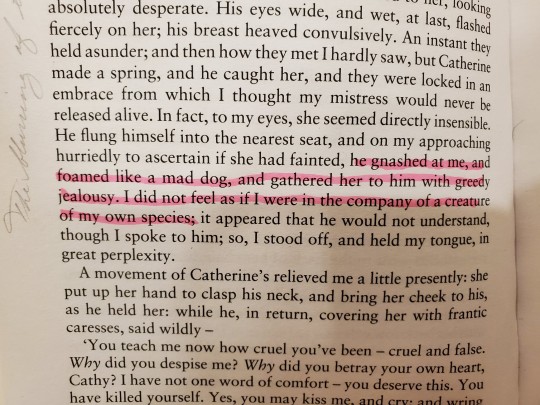


Doesn’t the acotar series seem like a 1/50 dilution of that energy?? And that is barely a taste of all the spiciness this book has to offer. To illustrate further: SJM gave us the F/eysand suicide pact and the near-death battlefield Nessian scene. One is certainly more outlandish than the other, but both are the result of intense emotions. To that Emily Brontë raises the following: Heathcliff asking the sexton to dig up Cathy’s grave to see what’s up because her ghost has been haunting him since he personally dug up her grave 18 years prior and she has been haunting him ever since. He later demands to be buried in the same exact grave when he dies so they can decompose together. They both married other people though which only adds to the mess. (I am not lying to you the Romantic tradition really gave us these gems lmao. As an aside, Mary Shelley was also a writer of the Romantic tradition and she confessed her love to husband Percy Bysshe Shelley on her mother’s grave. Her mother was liberal feminist icon Mary Wollstonecraft by the way which only makes this even more amazing. Additionally, biographers believe that the Shelleys also had sex there. Talk about Romantic 😉.)
Then I had ANOTHER thought! (Dangerous)
If we read the series from the point of view of just another YA high fantasy things might get a bit boring because the world-building is honestly lazy and the magic system is pretty soft, which isn’t a pre-requisite in high fantasy (The Lord of the Rings has a soft magic system) but it's not the norm and it doesn't pay off in this series. Not to mention that the plot is pretty lackluster and derivative. To add to that the romantic and sexual relationships are questionable in their healthiness and consequently are the source of much argument in the fandom.
But, dear reader, if we think about the ACOTAR series as being a sort of thematic and ideological 21st century YA homage to the Romantic tradition of the 19th century (within which Gothic Horror also lives), things get REALLY, REALLY SPICY.
No longer do we just have a romance fantasy with messy, hyper-emotional, animalistic characters who constantly partake in morally grey situations rife with dubious dynamics. No longer does plot really matter. No longer do we require quasi-scientific descriptions of the world and the magical system. No! All that matters now are the characters and the mood. Now we have potential! Add a lot of Nature ambiance: expanses of dark woods, great mountains, the unknowable and sublime energy of the ocean, a violent rainstorm/hurricane/tsunami, an impending snowstorm whose intensity reflects the growing emotional intensity of the characters as the story goes along (I’m looking at you impending snowstorm in acofas that curiously matches the growing complexity of Nesta’s emotional state). Blur the lines between any imaginable category: life and death, human and animal, known and unknown, Self and Other, beautiful and monstrous, good and evil, masculine and feminine, the list goes on. Most importantly make your readers uncomfortable by frustrating their desires to sort things into easy binary categories and don’t apologise for making them question their assumptions about the world, morality, gender, and any other kind of previously constructed Order.
Basically write the story with Dionysus-in-a-Greek-tragedy energy and bring to us mere mortals artful Chaos.
Once that is done we can have a literal Romantic/Gothic Horror story. The Acotar series could have been this unapologetically, with the added element of being told through the eyes of the "Cathy" character instead of through the lens of a third person getting second-hand accounts about what went on. This whole series is honestly enough of a chaotic mess of Byronic-like heroes and heroines and cursed familial relationships that it could have been that. That alone is peak entertainment. The problem, however, and the main reason why I can’t really say that this series truly delivered this wackiness is that SJM committed the act of not fully committing to the bit (very un-Romantic of her, I know). Now, I am not saying that SJM actually intended this. I’m just saying it really could have accidentally been this genius with some tweaks. Unfortunately, she made the crucial mistake of trying to justify too much, trying to make things too neat, too tidy, too sensical (in other words: the reason we really can’t have nice things).
I could end this here, lamenting the potential of what SJM had set-up for us were it not for one element, one gift:
Nesta
OHOHOHO DO THINGS GET GOOD HERE SO BUCKLE UP
Most of the characters refuse to fully commit to the bit in their desire to satisfy modern sensibilities, by which I of course mean they want ridiculous things like political power, to conquer lands, to be a Girl Boss, to get married, have kids, celebrate holidays, converse about mundane things, be relatable, etc. You know, pretty pedestrian stuff that only requires a bit of genetic luck, a sprinkle of energy, and the right circumstances within the world of Acotar. I would like to reiterate the beginning of this paragraph: most of the characters.
Let’s say you’re stubborn and you decide to still read the series through the lens of the Romantic/Gothic tradition, what happens then?
The most hilarious thing (for the Nesta stans that is. The antis would probably hate this)
Nesta, based on what we know about her through Feyre and the limited amount of other scenes, is the only character who really takes the performance seriously. She's the only one that SJM hasn't managed to confine through justification. Nesta just shows up and simply refuses to make sense (her POWER what a queen 👑). She is endlessly fascinating because she just exists in her world on her terms, established categories be damned, and in this manner she frustrates not only the sensibilities of the characters in the stories but those of the reader as well. This double duty is, I suggest, the result of the other characters not fully inhabiting the nebulous world of Romantic characters and thus being a little too plausible and understandable even if they are not justifiable.
Ok, you may say, but I relate so much to Nesta. I do understand her. I don’t justify all of her actions, but I understand where she is coming from. (You’re not alone, friend. I like to think these things too. Alas, we are but plebs).
To that I reply; Nesta does things, certainly, and we can spend hours trying to explain through extrapolation, educated guesses, and personal experience why she did those things, but the fact is we really don't know why. We are never explicitly told. Our insight into who she is and her motivations comes predominantly from the understanding of her youngest sister and from our own interpretation of the actions she takes. I must make clear that our own interpretations are rooted in pre-established assumptions about what is sensical and orderly in our own world and in our own lives. We cannot interpret with the tools available to us that which may be, by definition, unfathomable. It is simply paradoxical. Nesta, as we currently know her, is a construct derived from a limited number of scenes and our interpretations and projections of these scenes. Even the scenes where we get third person narration don’t explicitly tell us her motivations and her logic. For all we know there really is no comprehensible reason for her actions and that is endlessly amusing to me in how utterly Romantic it is. Acosf may and likely will change this of course, but as it stands, Nesta is a whole Romantic character. Her divisiveness in fandom and in the narrative could be due in part to her refusal to fit the discrete categories available in her world and ours.
Isn’t that wonderful?
To illustrate this a bit more I will share some details SJM gives us about her/ elements she sets up that fit in with the characteristics of the Romantic tradition (these are not exhaustive by any means):
The absolute pettiness (and extra-ness) of being so angry at her father’s inaction that she is willing to starve to death to see if he does something.
How in Acowae she is described as shifting between emotions as if she were changing clothes and feeling everything too strongly (probably to the point of destruction)
She is constantly being compared to animals, even when she is still human. Granted, SJM compares everyone to animals, but that strengthens the blurring of lines between usually discrete categories. It is still most powerful when used as a comparison when she is human because it dehumanises Nesta.
Often, SJM describes her characters as forces. Forces of nature, for example. Acofas is full of details like this in relation to Nesta. There is a storm brewing leading up to the solstice party and it is in full swing when she arrives at the townhouse. The language used there suggests that Nesta herself may be the storm (against the onslaught of Nesta). It really adds to the Maleficent energy tbh.
She is often associated with death post her transformation
She is Other even to Others. She was Made like Elain, Feyre, and Amren in a sense, but the process of her specific transformation differentiates her greatly from the others. As it is, she doesn’t fit in anywhere
Her intense attachment to her femininity and its expression are at odds with the ideas and assumptions about the performance of womanhood and a woman’s role in her world and even in ours. She is unapologetically feminine in her physical presentation, but her character, her thoughts, and possibly even desires transgress the unwritten rules of acceptable femininity (unfortunately there still are abject expressions of femininity in our ‘”progressive” mileux
She displays in many of her actions a disrespect towards authority and to the status quo. This is particularly notable when her intensely polarised sense of right and wrong is aggravated.
Her self-destructiveness. This is referred to most strongly in Acofas, but I would say she was remarkably blasé about self-preservation in Acowar as well
She is described as intelligent, cunning, ruthless, attractive, and prone to debilitating extremes of emotionality. All of these are characteristics of Byronic heroes, a subtype of the Romantic hero
Here are a bunch of quotes that touch on many of the elements that I have discussed above:
“I looked at my sister, really looked at her, at this woman who couldn’t stomach the sycophants who now surrounded her, who had never spent a day in the forest but had gone into wolf territory...Who had shrouded the loss of our Mother, then our downfall, because the anger had been a lifeline, the cruelty a release. But she had cared--beneath it she had cared, and perhaps loved more fiercely than I could comprehend, more deeply and loyally.”
--Acotar, emphasis mine, note the strong emotions. This is a recurring element for Nesta.
“Cassian’s face went almost feral. A wolf who had been circling a doe...Only to find a mountain cat wearing its hide instead.”
--Acomaf, animal comparison
“Nesta is different from most people,” I explained. “She comes across as rigid and vicious, but I think it’s a wall. A shield--like the ones Rhys has in his mind.”
“Against what?”
“Feeling. I think Nesta feels everything--sees too much; sees and feels it all. And she burns with it. Keeping that wall up helps from being overwhelmed, from caring too greatly.”
--Acomaf, emphasis mine
“I knew that she was different [...] Nesta was different [...] as if the Cauldron in making her...had been forced to give more than it wanted. As if Nesta had fought after she went under, and had decided that if she was to be dragged into hell, she was taking the Cauldron with her.”
--Acomaf, Nesta had her own plans for the Cauldron what a queen
“Something great and terrible.”
--Acowar, referring to her eyes. Oooh, spooky Nesta 👻
“The day she was changed, she...I felt something different with her [...] like looking at a house cat and suddenly finding a panther standing there instead.”
--Acowar, a two in one here: difference + animal comparison. Boy does SJM really go heavy when establishing Nesta as Other.
“‘Not in flesh, not in the thing that prowls beneath our skin and bones...’ Amren’s remarkable eyes narrowed. ‘But...I see the kernel, girl.’ Amren nodded, more to herself than anyone. ‘You did not fit--the mold that they shoved you into. The path you were born upon and forced to walk. You tried, and yet you did not, could not fit. And then the path changed.’ A little nod. ‘I know--what it is to be that way. I remember it, long ago as it was.’
‘I don’t know what you’re talking about.’“
--Acowar, show don’t tell gets thrown out the window here, but it is useful for the present purposes
“What if I tell you that the rock and darkness and sea beyond whispered to me, Lord of Bloodshed? How they shuddered in fear, on that island across the sea. How they trembled when she emerged. She took something--something precious. She ripped it out with her teeth. What did you wake that day in Hybern, Prince of Bastards?
What came out was not what went in [...] How lovely she is, new as a fawn and yet ancient as the sea. How she calls to you. A queen as my sister once was. Terrible and proud; beautiful as a winter’s sunrise.”
--Acowar, who knew rocks, darkness, and the sea were such gossips, but look how many connections to nature! To be compared to the sea, a significant example of the sublime, is peak Romanticism. If any of you have read Moby Dick, think about what the ocean and the white whale might have represented there and how that might relate to Nesta.
“I think the power is death--death made flesh.”
--Acowar, Feyre referring to the possible nature of Nesta’s power. Alluding to her powers possibly being related to death is quite significant because that is something most of us cannot comprehend, nor can most of the characters. For Nesta, a “reborn” but very much living character to have death associated with her is a strong blurring of the lines. The case of her being labelled a witch is similarly significant as it solidifies the elements of the supernatural while simultaneously comparing her to pretty much the only exclusively female-coded monster in western pop culture. I will touch more on this when I do my study of Nesta through the framework of Barbara Creed’s Monstrous Feminine.
“I am not like the others.”
--Acowar, we love a self-aware queen.
“Nesta took in his broken body, the pain in Cassian’s eyes, and angled her head.
The movement was not human.
Not fae.
Purely animal.
Purely predator.”
--Acowar
There are a lot more details and quotes that support this interpretation, but I didn’t write them all down in my archived notes. This post is obscenely long, however, so even though there is more to be said, I’ll leave it for another day. If you made it this far you really are an MVP and probably love Nesta to a concerning degree like me. Please rest your eyes if you’re actually reading this 😂
I’d love to read about any other takes and thoughts that might have come to your minds after reading this monstrosity,
G
#nesta archeron#nesta stan#acotar#acomaf#acowar#acofas#acosf#analysis#wuthering heights#romanticism#byronic hero#the other#emily bronte#sublime#abject#This post is as monstrous in length as Nesta is in character#literature#why didn't I have this energy and dedication while I was getting my degree#I really had to go into my Nesta archives for this post and type up#many of the quotes I had written by hand three years ago to back up these points#pro nesta#but seriously#if you're reading even the tags#all I can say is...wow#thank you#my headcannon is that Nesta reads Romantic literature#or Prythian's analog#that would be so meta#but imagine having Nesta's power#people hate her just for breathing
25 notes
·
View notes
Text
The Tyrant Baru Cormorant

I'm way behind on book roundups, I finished this back in October but never wrote up a final impression because my brain is bad and I am bad. So these thoughts are somewhat less fresh.
The third book in a trilogy that has become a quartet is a tricky place to be. You can kind of see the ghost of an ending in the structure but there are too many threads flung far across Dickinson's seas - the scope has expanded drastically since book 1. I'm glad to say, despite this, The Tyrant is still thrilling, book 2 seemed to wallow in its scope sometimes but here it builds and builds to a final sequence of chapters that layers cliffhanger upon cliffhanger, dangling from a few fingers over the edge you discover the cliff itself is teetering on another greater and itself unstable cliff.
There is no credo about the relationship between truth and hurt to serve as epigraph this time, instead Dickinson relates the true historical tale of Vasco de Gama inflicting nightmarish crimes on the Indian city of Calicut in 1502. Dickinson's project has always been unmistakably anti-imperial, but here he begins with yet a further, sicker truth - the things that will be recounted here are terrible beyond fiction.
Thematically the 2nd and 3rd book are less pure in conception than the first. That terrible sickness and betrayal is tempered by Baru's growth as she learns to become human again. But it renders Dickinson's "working from within" narrative a more thorny. She positions herself as the sole inheritor of revolution & the Brain rightly asks - and what if you fall and lose your memory, what if you die? Baru has no answer. Then the Throne has what it wants, the Mbo begins to succumb. Baru is inoculated against co-operation by her initial tragedy but I still find her methodology is not liberatory. We cannot hope for some maverick senator or Koch heir to machinate the downfall of the USA. It would be absurd to propose. Not that I am asking this to be a manual for revolution but Baru's revelation vis a vis cultural inheritance, the incomparable collective nature of such knowledge is not reflected in her plan. She wants to argue the eugenic value of lesbians theoretically at the Metademe for god's sake. This is ludicrously naive. That is to approach Incrasticism as something actually interested in optimisation rather than reproducing fascist ethics.
Would Dickinson dare to have her fail? That would be an astounding move but then so was the first book's denouement.
Thinking back to the first book there is something, I think that has been lost along the way for me. Baru's final betrayal in The Traitor has such a potent gravitational pull I find my mind in its nauseous orbit even now. Her terribleness, the awesome evil of it is attractive in a way that growth and development isn't. I crave damage, perhaps. Hurt is my literary drug of choice. Growth is often feels less true as The Traitor and The Monster's epigraphs would have us ponder on: it's true because it hurts / if it hurts, is it then true? There is something unsaid, unspent in deciding no longer to live in hurt. But the saying or spending would only be a repetition, a ritual of the imaginary purity of being wounded forever. But lately I feel addicted to that wounding - the hard, drudging work of becoming better lacks the same sugarspun taste of destruction. But we're a little distracted.
I can say decisively in the book's favour that Dickinson is now truly stretching his ideological muscles. Everyone battles with deep, difficult questions - the Brain worries at the distance between sign and signified,
"Maybe gods have no consciousness because they do not need it. Maybe that is why they don't answer prayers. They cannot conceive of the world except as it is."
We are confronted with the question of Iscend - a microcosm of the empire's project. Does she have her own agency? Conditioned from birth for her desires to adhere to the republic's, can she make a choice that we can designate as her own? If we say no, are we saying she has become inhuman, she is wholly lost to the ideology of empire, she can never self-determine? Any person she might grow into would still be a result of that conditioning, the poison of Falcrest runs deep. But this doesn't seem acceptable. So we have to liberate ourselves, as people also indoctrinated since birth into a system of imperialism and supremacy, and try and understand what it means for us to exercise agency.
Further, I cannot really plumb the ethics of Tain Shir - and I don't have enough word limit left to try. Basically: political necessity of destruction? No justice only "asymbolic truth"? Primacy of self-determination?
And over and over again we see character's stuck in Baru's original bind. Any atrocity can and must be justified in the name of the ones already committed, the engine of destruction can never be wound down because that renders it pointless, renders its final ideal hollow:
"And the endless self-deceptive blind guilty quest to justify that false science, so that the suffering and misery remained necessary."
But Baru has finally devoted herself to being alive and I am content with the faux ending for now. A moment of peace and companionship for a mutilated woman, a traitor, a monster, an aspirant tyrant striving to be better.
#hit the word limit on this one oop#this is long and unfocused sorry it's been too long since i finished it#also i am now realising i never did a post for the 2nd one if u wanna know my thoughts you will just have to message me#read the masquerade series its good thats the moral#crit#review#seth dickinson#the tyrant baru cormorant#books#fantasy#oh theres also that stinger epilogue about the weird lightning men THATS a whole thing#implies a lot about so called causal closure!!! there are things of which we know not!!!!!
7 notes
·
View notes
Note
the untamed is on netflix, right? i think i've seen it. i'm enjoying your posts about it and my mom would love if i watched a chinese show (it looks chinese, i might be wrong though) but i'm kinda short on time so please pitch to me why i should watch it so i will be convinced and look past the lack fo time
Anonymous asked:
ok the untamed looks cool af how doesone watch it
A L L R I G H T I’m finally going to make a rec post, I’ve put this off long enough. You’ve definitely already started to watch it, clever, so please forgive me for using this as an excuse to pitch this show.
So, for starters, Anon, The Untamed is indeed on Netflix! It is in Chinese! If you (like me) do not understand Mandarin Chinese, the Netflix English subbing is…fine, it’s fine, but I recommend poking around in the fandom because every single form of address is changed to the character’s full name. And maybe I just spent too much time doing translations for my old Spanish and Chinese and especially Latin classes, but I think there are some things that, A, shouldn’t be translated or, B, should be translated awkwardly over being translated incoherently.
I digress. My thoughts about maintaining forms of address in their native language for the sake of clarifying levels of respect/etc are not relevant here. Chuck a note in my inbox if/when you get confused about everyone’s three names and I’ll write/link you a guide.
POINT IS. The Untamed is an adaptation of the novel Mo Dao Zu Shi, which is generally translated as “The Grandmaster of Demonic Cultivation,” and my quick pitch for it is: There’s a plot, sure sure, it’s the story of Wei Wuxian (his fall from grace to Most Hated Person In Magic!China, and then his resurrection and efforts to solve a murder), and if you like character-driven fantasy narratives you Will Like This
B U T
You know that post “but is he…you know…your narrative foil?” That’s this show. If what you crave is “one character committedly pines over another for twenty years even when the entire world hates that person,” please let me interest you in Lan Wangji, the love interest. They have a kid together. It’s a great romance. Literally what else do you want from me. I love a narrative foil, I love a tragedy, I love an epic love story, I love a found family. And good GOD do I love a character who self-destructs in an effort to do the right thing.
Wei Wuxian isn’t evil. He’s not even especially malicious. But when the chips were down and he needed to survive, and to save people, and to figure something out, he took the only avenue left to him, and it was—it was inevitable, really, that it make him the villain of the piece. He saved a lot of lives. Everyone except Lan Wangji hates him for it. He’s already thoroughly despised by the time he starts actually doing things that are objectively bad. Talk to me about it forever.
My usual list of free-form associative Things I Like That You Will Probably Also Like under the cut:
Wei Wuxian! I know he’s the main character but I love him so much that he gets a bullet point! He’s the kind of lighthearted goofball who’s perfected the “I Would Honestly Die Before Showing Emotion To Anyone, How Dare You Imply That I Am Not Sincere In My Perpetual Good Humor” mask, and it hits like a sledgehammer when that mask cracks. I would watch this actor flip between smiles and homicidal rage all day. He gets a hug from Son Boy in the last episode and I almost cried. 50000/10.
Lan Wangji! A great love interest! Noble to the core! Incredibly bitchy! I want five more just like him!
This is where I mention that China has strict censorship laws, so, despite the fact that they kiss and have sex and get married and the whole nine in the book, the show is all Intense Staring And Love Declarations Where They Never Say The L-Word. But like. Please trust me, it’s actually So Romance. If anything I think I like the romance in the show better.
Wen Ning!
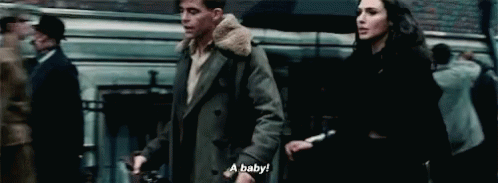
I don’t have anything else to say about him, I just love him so goddamn much. He and his sister Wen Qing are stars and the rest of these sinners don’t deserve them.
COMPETENT. VILLAINS. I’ve spilled a lot of ink on this one lately, but I love competent villainy, I love villains who have Goals and plan to Achieve Them and actually pull it off. Jin Guangyao, the big bad of the “present”(the part where Wei Wuxian is resurrected and kicking around trying to solve a murder), is actually phenomenally good at his job and I support him even though I enjoyed watching him go down in flames. There are enough villains in this show for everyone to have their preferred type of villain, from Devoted Right Hand Man to Megalomaniacal Overlord to Freewheeling Engine Of Death. GREAT villains in this show. Which brings me to…
YI! CITY! ARC! I’m not going to tell you that much about it, but it’s dark and tragic and features my very favorite villain in the entire show, Xue Yang, who is just. *chef kiss* A horrible monster of a man. An unapologetic, cold-eyed shriek of a villain. The very best at what he does, and what he does is absolutely horrible, and I would watch an entire series about this five-ish episode arc. Also, I’ve adopted Song Lan/Xiao Xingchen from the Tragic Ships Shelter and someone should toss me a headcanon ask for them. Any AU your little heart desires. I love them.
THE MAGIC! I know it took me a long time to get here, but it’s a very character driven show and I am a very character driven person and I just wanted to yell about characters for a minute. But anyway, I’m told that the Untamed is a great onboarding point for this genre of Chinese fantasy novel, because they do a really good job of making the necessary points accessible. I had no familiarity with wuxia/xianxia/etc when I started watching this and everything about cultivation made sense to me, or at least enough sense to be going on with. It’s very lovely and fascinating and it’s where they put their Entire Non-Clothing Budget.
This is where I mention that their effects department clearly used their entire funding for, like, cool sword stunts and beautiful clothing. The wolf puppet in particular is just. Almost adorably terrible. If that’s going to severely impact your enjoyment, Idk what to tell you, man.
Related to the above, I love plotlines about characters losing control of their magic. That’s all I’m going to say about it.
Unreliable narrators, baby! They set up a lot of concrete facts about Wei Wuxian in the first two episodes that become obvious as complete bullshit as you go on, and it’s very satisfying to watch! See also, Nie Huaisang, the most unreliable narrator of them all, whom I adore.
Beyond all those things…it’s just got a lot of great relationships in it. It’s hugely driven by the affection people have for each other, or the places they feel they’vebeen deprived of that affection. It has a lot of iterations of the same relationship in wildly distinct ways, if that makes sense—offhand, there are maybe four major sets of siblings, five if you count the Jins, and they are all radically different and insanely compelling. The basic structure of Wei Wuxian/Lan Wangji, the “black cultivator/white cultivator on a crusade to change the world” thing, appears a lot of times, and goes horribly awry in a slightly different way for all of them. That kind of in-universe repetition of themes, doing the same thing over and over again looking for the Right Path, is one of my favorite things to appear in a story—see also, the Kencyrath (twins, Dreamweavers, Knorth lords, loyal Kendar, etc), the Animorphs (warrior teams, deaths on the field, etc), any number of other things I yell about.
TL;DR: The story is great and the cultivation is fascinatingand the schemes are elaborate, but
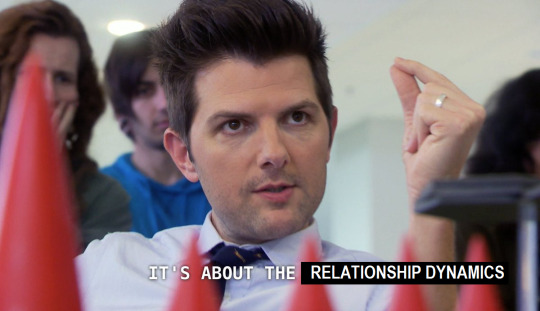
#the untamed#mdzs#mo dao zu shi#SORRY CLEVER YOU'VE DEFINITELY ALREADY STARTED IT I THINK I JUST ANSWERED ANOTHER ASK FROM YOU#I GOT DISTRACTED HALFWAY THROUGH THIS POST AND FORGOT ABOUT IT FOR SIX DAYS#i cannot be trusted i am sorry#but yeah anyway#show rec#here's the post that i'm going to link people to if they're looking to know why I Personally am into this show#'what's the plot star' WWX WAS AN ADMIRED HERO. THEN HE WAS THE MOST HATED MAN ALIVE. THEN HE DIED.#NOW HE'S BACK AND HE HAS MORE PROBLEMS.#THAT'S THE PLOT#WHO CARES ABOUT THE PLOT I CARE ABOUT THE ANGST#that's not true i also care about the plot#but like. if i'm recommending you the show you'd best believe it's because of the above reasons.#a queue we will keep and our honor someday avenge#insert-cleverurl#asked and answered
97 notes
·
View notes
Text
Second ‘When Christ and His Saints Slept’ reaction post (part one here), covering chapters 11 to 20 aka the bit where I start shipping actual historical figures for the first time ever (other than Wars of the Roses-era people, but that’s different because they were actually married and it wasn’t a ship ship in the same way these are. Anyway.)
Chapters XI and XII:
Annora and Ranulf still love each other :) and they found a loophole so they can get married when Maude's queen! I really should've remembered about that plight-troth. Now a bit worried about all the ways this could go wrong, not least because I'm aware Maude doesn't become queen, but that was really sweet and I'm glad they're happy and things have been resolved (ish)
UGH, GEOFFREY. He's being awful about Maude and Henry's overhearing :(
Between the odd mentions of her here and what little I know about her historically, I'm so excited for when Eleanor of Aquitaine shows up!
Whoops, Chester. Genuine anger and a lack of mercy from Stephen may be a rare thing, but I have a feeling this has crossed the line.
I like it when Maude has interactions with people she likes and trusts - her brothers, Adeliza, and now Brien. It's good.
...okay I might be starting to ship this.
Oh dear I'm definitely shipping this. It's impossible and a mess and they both (Maude especially) seem like they'd rather be swallowed by the earth than actually admit to feelings, but it's so sweet and they trust each other so much and must have such a long shared history? Help?
And also lbr this is just That One Dynamic that absolutely kills me in every piece of media. The mutual trust, the quiet but unbreakable loyalty, the circumstances making things so difficult for them? This is absolutely my thing.
This might be the first time I've actually shipped people who existed. Like, there were some good moments in TSiS but all with people who were actually couples in real life. But with this, I don't know many of the specifics, I have no idea what happens to Brien and only know slightly more about Maude. This is strange.
AAAAAHH. Maude you can't do this to my heart. You just can't.
Chapter XIII:
I like Robert.
Hmmm. Looking at both sides' chances in this battle, and knowing Stephen gets captured at some point during the Anarchy, I have a feeling I know how this will end.

Why does it feel like the awful déjà vu of this part was intentional. This is making me have Bosworth-related emotions all over again.
Okay, wow, that was all quite a lot to take in. Chester's plan was good, and I'm grateful that he saved Robert; wasn't expecting William of Ypres of all people to flee*; Stephen's determination is also making me remember Bosworth in TSiS; I liked the bit with him and Robert and Ranulf at the end.
Chapters XIV and XV:
Aww, family (Maud and Robert and Ranulf)
Maude :')
Matilda just found out about Stephen :(
Maude's going to have trouble winning over the people. London's apparently still loyal to Stephen, and their favour was often an advantage in struggles like this war (looking at you, Edward IV)
I'm feeling more sorry for Constance with every scene she's in or mentioned. Things just keep getting worse for her.
William de Ypres just showed up; Matilda is (understandably) furious about the Battle of Lincoln and letting him know it.
Alliance time! This is one of the things I was vaguely aware of before starting the book, and the anticipation of it has been a lot of fun. Also, I like how honest he’s being here - he made a choice, realised/decided it was the wrong one, and is making no excuses, instead being clear that he wants to try and make things right. The contrast with, say, Bishop Henry’s total lack of self-awareness (or maybe it’s wilful ignorance?) about his moral bankruptcy is wonderful.
Chapters XVI and XVII:
My ship! They're interacting!
HAND. KISSES. My weakness. I know they're the norm and not necessarily romantic at this time but still.
I am deceased. This ship has killed me and they've only had two direct conversations.
Bishop Henry is possibly about to switch sides. Again. I ought to keep track of who’s betrayed both sides the most times (probably him right now).
It's been four months since Matilda joined forces with William de Ypres to try and save Stephen, I wonder what they've been up to? (They haven’t been mentioned in the novel since then)
Everything about this:
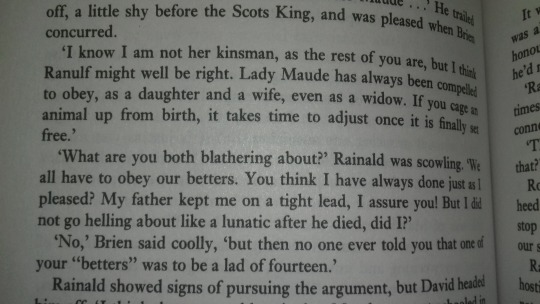
and then THIS:
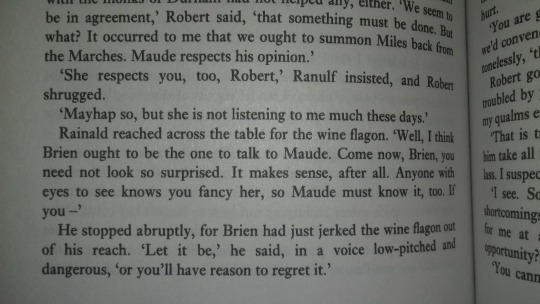
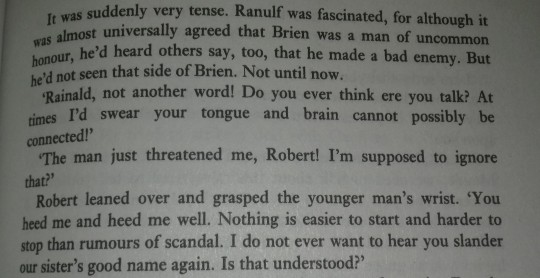
I love this conversation for so many reasons. Most of which involve Maude and Brien because apparently now I’ve dedicated my life to being emotional about them.
Matilda!!! It’s been too long.
Okay, so based on Northumberland's thoughts:
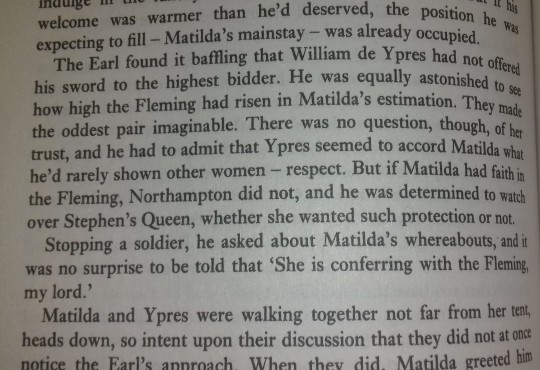

hmmm, new ship?
they're using nicknames they're being familiar this feels like a Big Deal for people in their position at that time. It’s certainly a level of informality that very few others have in the book so far.
Wait they just mentioned a Thomas Becket. Is he that Thomas Becket? I know his feud was with Henry II, whose reign begins in about fourteen years, so it's possible.
I love every mention of the chronicles. It's really cool having the regular narration of the novel interspersed with little pieces of old accounts.

I also love the little moments like Ypres here and his quiet admiration of/confidence in Matilda.
Chapter XVIII:
Not content to just leave me to deal with my feelings from the last few pages, the chapter opens with this:
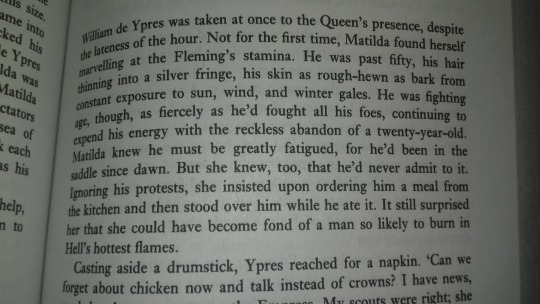
Immediately following that last part, we now switch to Matilda’s thoughts about de Ypres? He’s trying to hide his exhaustion and she’s not having it? Literally standing over him to make sure he eats? Fond??? Yup, I'm definitely invested in it now. These relationships will be the death of me.
Stephen listing Ypres as one of the people who he could never expect to help Matilda :')
And he's just found out about their alliance!
The guard saying "No one knows how your lady won him over" before being cut off is just really funny. I'm just picturing all of England in total confusion about how Matilda managed to get this cynical, battle-scarred mercenary's unwavering loyalty after Stephen couldn't manage the same. Just. The entire country, collectively looking at this alliance and going '???'
"I had my own miracle all along. I'd married her!" Stephen you cinnamon roll you're completely right
Maude and Brien Maude and Brien Maude and Brien Maude and Brien Maude and Brien Maude and Brien
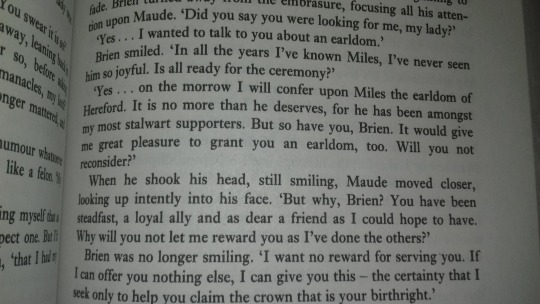
:DDDD
...I have become hopelessly obsessed. This book has two ships that are my favourite dynamic. Two. This is turning into Code Geass all over again.
(The dynamic is "mutual trust, admiration and respect; if there are romantic feelings, they might be ambiguous and possibly not acted on for any one of a number of reasons, most of which can be summed up as ‘external circumstances getting in the way’; absolute loyalty through thick and thin; help each other grow and get through difficulty; one or both is probably also a little scarred by the world". Bonus points if they have a long history, or any period of time spent together that’s not fully described in canon and can therefore be speculated about.)
Chapter XX (and some reflections on XIX):
The thing about recognising Matilda’s habits:

made me think immediately of this post
Hell yeah teaming up to get Chester to leave.
Ypres just internally being like “oh god I’m actually caring about someone’s emotional wellbeing what is this what do I do”:
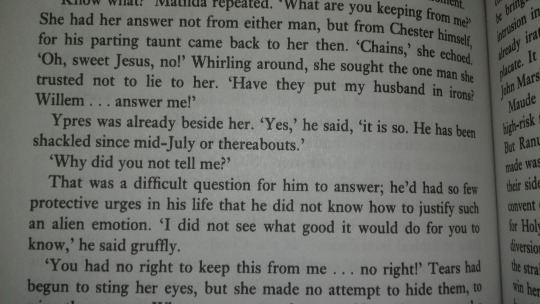
(also “the one man she trusted not to lie to her” is sweet but it’s also kind of upsetting that Matilda’s surrounded by allies and yet knows she can’t fully trust most of them)
my heart???
Some of my favourite ships are the ones where I don’t even know if I see it as platonic or romantic, just that these people have such deep affection and trust for each other and it’s wonderful. This is absolutely one of those ships.
I’ve not written anything about the destruction(s) of Winchester, mainly because this book is once again difficult to put down, but suffice to say that it’s pretty harrowing. Seeing things from the perspectives of Maude and Matilda, who haven’t witnessed this side of the war up close before and are feeling responsible for everything awful that’s happening, as well as Ranulf, who’s similarly horrified and hasn’t seen this kind of destruction before, possibly makes it even worse. Also I love the occasional scenes from the point of view of ordinary citizens – it really makes the wider effects of this civil war between cousins sink in. This may have begun as a personal tragedy for Maude, Stephen and their loved ones, but it’s become a catastrophe affecting so many more people across England, Normandy, Anjou…the fact that the narrative brings in the thoughts of people from all across society in recognition of this is one of the things that makes this book so good imo.
Okay, so I’m getting very attached to quite a lot of these people and it’s occurred a few times that I don’t actually know the dates of death for anyone except Stephen. But because this is history and also the first book in a trilogy spanning many decades and the characters are (as far as I know) not immortal, they’re all going to die at some point. I just don’t know when. There is no way to be prepared for the sadness that this book and its sequels will bring.
OH NO RANULF
At this point he should really just stop trying to break into nunneries. As Gilbert mentioned, it never seems to go well.
Wait, if they’re specifying not to kill Ranulf does that mean everyone else who was with him was killed? FEAR
Okay good there are more survivors
That fire was awful. Although I’m going to keep in mind that Gilbert and Marshal are only dead according to the people outside the church – the narration moved away from them when Marshal lost his eye, so there’s still hope (albeit not much). Also, this really showed both sides of de Ypres – he’s managed to be merciful and ruthless in the same paragraph.
Ancel!
And Ranulf is free, but with a hefty dose of survivor’s guilt.
Awww, Maude’s really openly relieved he’s safe. Robert too.
Gilbert’s alive too! I’d suspected but wasn’t sure. Glad for him and Ranulf that they’ve got each other back.
*I’d known that he’d abandoned a battle at some point before allying with Matilda, but had thought that referred to his feud with Robert during the Normandy campaign, which was briefly mentioned earlier, so this came as a surprise.
#when christ and his saints slept#sharon penman#witness my slow descent into madness#a solid 90% of which is thanks to about five characters#and the realisation that this book contains That Dynamic#that I'm always weak for#iz.txt#penmanblogging
5 notes
·
View notes
Photo
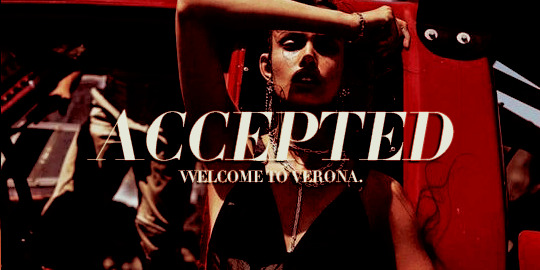
Congratulations, KYLIE! You’ve been accepted for the role of BENVOLIO. Admin Julie: If I could, I’d wax poetry over the intricacies that came from reading your application for Bellamy. From the inherent bravery that comes from being kind in a world that eats kindness whole, to having to learn how to survive in that sort of environment, you’ve enraptured us with Bellamy’s conflict and narrative. Your writing sample captured an emotion note often seen in Verona: panic, terror, and worse, acceptance. The seven stages of grief, compounded into one man? It’s awe-inspiring and heartbreaking on one. We cannot wait to see where you’ll take him. Please read over the checklist and send in your blog within 24 hours.
WELCOME TO THE MOB.
OUT OF CHARACTER
Alias | Kylie
Age | 25
Preferred Pronouns | she/her
Activity Level | 5-6, the holidays have been a busy time for me, but now that they are coming to a close my activity should only go up.
Timezone | mst
Triggers | already listed!
How did you find the rp? | I am a member who loves it dearly.
Current/Past RP Accounts | @ronanivarsson @nickborisov
IN CHARACTER
Character | Bellamy Santo-Domingo, Benvolio
What drew you to this character? |
I was drawn to Bellamy because I was thinking about the idea of heroism in Verona, and came to the conclusion that he must surely be the closest thing that Verona has to a real “hero” or heroic figure–what could possibly be more admirable than advocating for peace in a city where it is universally acknowledged that peace, that goodness, cannot thrive? I began comparing him to classical heroes like Aneas, who was divinely tasked with building a new city from the ashes of an old one, who was able to maintain his epithet of pious even as his city burned and the blood of his people was spilled. Because of his relationships with Marcelo and with Roman, both Achilles figures in their own right, I compared him to Patroclus–in the same way that Patroclus put on the armor of Achilles and went out to fight the Trojans, Bellamy has learned to put on the same armor that Roman and Marcelo wear in order to better protect them.
These comparisons have merit–but I think it would be a mistake to allow Bellamy to be so easily defined. I think a lot of contradictions exist within him–his banner is peace, he has cried and cried for it until he has lost his voice, but I think he also holds a lot of anger in his heart. He is angry that he seems to be the only one who can see where all of the destruction will lead, he is angry that the people he loves are so willing to gamble with their lives, he is angry at the fact that none of this is what he would have chosen for himself. I also think he is both very self sacrificing, as all heroes must be, but also very selfish. He would willingly give his life for Marcelo or Roman, or if he thought his death would mean something in terms of bringing peace to Verona–but at the same time, I think he would also willingly leave it all and go back to wandering, to make that choice for himself and shed the uniform the Montagues handed to him and ordered him into.
I also just enjoyed all the potential that exists within him–what is the difference between the person he would like to be, the person that he sees himself as, and the person he has to be in order to survive in Verona? He is an Atlas, bearing the weight of an entire city on his shoulders, but surely even Atlas cried out in pain, began to curse the gods at some point? How much blood must he shed in his quest for peace? Will there come a point where he has to turn his back on the people that he loves, on the lives that they lead?
What is a future plot idea you have in mind for the character? |
DEATH DOESN’T DISCRIMINATE BETWEEN THE SINNERS AND THE SAINTS | I’m very interested in Bellamy’s relationship with the violence of the Montagues–he is a character that is defined by his goodness, by his desire for peace over violence, but I don’t think that makes him a soft character necessarily. I would love to investigate how far both he and his convictions could be pushed, where his point of no-return might be. Would he kill for them? Would he be willing to torture someone? If he is willing, how does he justify it in his mind? Is it a case of some blood being necessary in the quest to bring peace to Verona? How would he handle it if Roman or Marcelo specifically asked him to commit an act of violence in their name? Is there a point where he would consider himself too far gone, too far lost, too much of a sinner?
IF THERE’S A REASON I’M STILL ALIVE | One of the things that really interests me is the relationships that Bellamy has with Roman and Marcelo. He came back to Verona because his mother asked, because he felt a sense of familial obligation, yes—but he also came back because he was worried about his brothers. They are the reason he stays, the reason he wants peace in this city—he wants to see them grow old, see them have faith in something other than the blood. I would love to investigate how far he’s willing to go for them, what kind of situations does he have to bail them out of? Would there ever come a point where he would decide that he’s more dedicated to his cause than to the two of them? Is there any resentment between them because of Bellamy’s dedication to peace, to opposing the organization that brought the three of them together?
THERE ARE THINGS THAT THE HOMILIES AND HYMNS WON’T TEACH YOU | I’m very interested in Bellamy’s job as a police officer, especially since it isn’t a job that he picked for himself—I was very interested in the phrasing in his biography, in the use of the word “posing” when talking about his position as a law enforcement officer. Does he feel like he’s wearing a costume, when he wears that uniform? How dedicated is he to the work? He wants to help people, but can he balance that with doing the bidding of the Montagues? What would he have chosen for himself instead? How does he interact with the other officers who are Capulets?
Are you comfortable with killing off your character? | Yes, if his death really meant something–but I’m also kind of attached to him suffering the same fate as his namesake, of being the only one left alive with the carnage of the very thing he had fought so hard to prevent.
IN DEPTH
He drops his keys three times before he manages to stop his hands from shaking. It takes another three attempts before he’s able to unlock the door to his apartment, three heavy footed and stumbling steps before he is inside and able to collapse his weight against the wall of the entryway, before he is able to slide to the floor and hide his face behind his hands without the fear of being seen.
Because if anyone saw him right now, there would surely be more questions about Bellamy Santo-Domingo, more doubts about the soft hearted boy who surely doesn’t have the same stomach for blood, the same singular eye fixed on his own divinely appointed destiny, that his friends have. He’s certain that’s why Damiano had asked it of him, had filtered it down through Pandora who had said it as though it was just another task, another meaningless item to be efficiently checked off a list. If Bellamy could kill some no-name dealer who thought himself brave enough to sell on Don Montague’s territory, then there could be no more questioning his loyalty—to his family and to the Montagues as a whole. He would finally be equal to Roman, to Marcelo—an unquestioned part of the future that the two of them would build.
And he had almost done it, hadn’t he? He’d had the man dead to rights in the darkness of an abandoned warehouse, had the cold steel of his standard issue pistol pressed against the man’s temple–he’d even allowed him to say one last prayer to his God, though the words had been half choked out through sobs, and had fallen on ears both unqualified and unworthy to hear them. All that remained was to pull the trigger, to force his fingers into applying the specific amount of pressure that would end the man’s life.
His hands had been suprisingly steady then, the muscles of his jaw had been clenched but unwavering, his eyes had been cold and unfeeling–the very model of a soldato, someone that Damiano Montague could have been proud to call family, something like a son. He could have done it, he could have left the man to bleed out onto the cement and dedicated himself to finding the bottom of as many bottles as it took to render the memory of it nothing but haze and the aftertaste of copper. He would have been fine, in the same way that everyone in Verona is only ever fine–in the same way that anyone who has ever taken another life can never be good again.
In that moment, Bellamy Santo-Domingo made the radical decision to be something other than fine for the rest of his life. He lowered the gun.
He told the man to get out of Verona, that the next person who came for him would not be in possession of the same kindness.
It was then that his hands had started shaking.
Bellamy was certain that Damiano had meant the whole excersise as a test of his loyalty, to the Montague cause, to the actions that would be nessecary if they were going to win the war he was waging against Cosimo Capulet. He had meant to see if Bellamy could be hardened, if the soul of the poet could be worn away by a continually crashing sea of blood and made into a new and more useful shape. It was why he had merely nodded when Pandora had issued the command, instead of challenging her as he normally did. He had wanted answers to the same questions, and tonight he had received them.
On the floor of his apartment, Bellamy Santo-Domingo sobs into his hands. He sobs in a way that is anthetical to the very foundations that Verona is built on–he sobs unashamedly, as a howling prayer of thanks to God, not because he is overcome with tragedy. He sobs because the heart that beats inside of his chest, that stubbornly hopes and cries for something better for the people that he loves, is not so easily vanquished. He sobs because above all else, in spite of the war raging outside of his window, he has remained loyal to that hope, to the idea that peace is possible. He knows the metric by which he will be measured now, and it is not the number of lives that he takes in the name of Montague, it is not the amount of cruelty that he inflicts–it will be the number of lives that he saves, the world that he builds for the people that he loves.
There is no blood to wash off of his hands, to stain the porcelain of the bathroom sink rust colored for weeks on end. There is only sleep to be had, a new day to be lived beginning to be visible over the horizion. There is a war to be waged, and he will need the rest if he is to continue to stand between the two sides underneath his own banner, if his voice and the strength of his words is to fly between bullets and knife blades until both can be set down. He wipes at his eyes and gets to his feet, and Bellamy Santo-Domingo laughs. He cannot wait to begin.
Extras: pinterest board x
4 notes
·
View notes
Text
im gonnaaaa revise and post my very dirk centric analysis of the epilogues here as well
also in case it needs stating, spoilers abound!
i read through both of the epilogues simultaneously yesterday, consuming both at the same time rather than one and then the other, and i feel like while it may not have been the most “satisfying” approach from a character-centric perspective, i have a more complete understanding of the stories than those who read them separately. if you’ve read through both and have the stomach to do it again for some reason, i suggest doing it in parallel, m1 c1 m2 c2 etc.
i will warn you though, i ended up having two nightmares at the same time in my dreams last night. like, simultaneously, two separate threads of terror unraveling in my subconscious. i woke up this morning already knee deep into an analysis of the homestuck epilogues, and it was less like “waking up” and more “becoming aware that i was conscious”
anyway, without further ado!
dirk killing himself in candy 14 is the scene that resonates with us as being “dirk” because it is. that’s all dirk, our dirk, the one from homestuck. he Has to do that in order for candy to continue being candy, and part of me believes that he knew that on a conscious level—hence his death being just. he knew he wouldn’t get a nice fluffy outcome in the candy timeline because him, all of him, not just this one instance, was fated to be meat dirk.
—and speaking of, the concept of Ultimate Selves pretty much squares away meat dirk. he doesn’t read like our dirk, the one from homestuck canon, because the narrative explicitly states he’s Not anymore. he’s become all of him, all of him from across paradox space, including notable players bro, doc scratch, and lord english. dirk’s Ultimate Self is a culmination of every possible him taken to the highest intensity. it reads like one of his personal nightmares because it WAS his personal nightmare—the personal nightmare of our dirk. he’s a prince of heart. the ascension to his Ultimate Self resulted in the complete destruction of the barriers between his splinters. the more i think about it, the more brilliant it is. he seems out of character as the dirk we know and love because he isn’t.
i feel like i finally Get it, but i’m still not looking forward to seeing people who dislike dirk using this to discredit the progress he made on his personal journey (ie “see he was evil the whole time!”) nor am i looking forward to all of the “dirk would never do this! it’s ooc writing!” from people who seem to have missed the part of homestuck where what scared dirk about himself most was the undeniable truth in it. there’s more than one example of “bad dirk and/or dirk byproducts” out there in paradox space. it’s more than feeling like you “might” be bad, it’s… being afraid of what you would be if you weren’t so afraid of being it, it’s seeing things that were a result of You-but-not-you and having to stare down the fact that even if you weren’t bad, even if you didn’t, you could have, would have, did. dirk’s Ultimate Self being a nightmare scenario is ..almost a recursive throwback to his fears about his ultimate self (note capitals)
him taking control of the narrative was epic though. it honestly did not catch me off guard? it makes sense. it is a 100% dirk strider move. if you haven’t read it by now for some reason, go read detective pony. i am diagnosing you with read detective pony by sonnetstuck. it’s terminal.
the only two people aside from hussie to have controlled the narrative in homestuck canon are the cherubs. and i did make the point somewhere up there that dirk absorbed lord english, and by extension, caliborn. that’s WHY he got that ability. not because he’s a prince of heart. dirk controlling the narrative makes sense from the perspective of dirk controlling the external narrative as well, ie, the whole thing is on a piece of paper that he wrote as some form of bizarre cathartic self punishment for his existence, but in the grander scheme of things and truth of homestuck dirk controlling the narrative makes sense as the puppetmaster-turned-puppet we see him become in several of his iterations, because caliborn literally becomes part of him.
everything is so skewed by the narrators. yes, both of them, because the whole point of the epilogues is that both of them suck and muse calliope is just as shitty as “impartial” “narrator” as Ultimate Self dirk is. it actually makes the whole thing a lot greyer in morality than it comes across at first. US dirk does a lot of Bad Shit as narrator, yeah, but even as passive as she is, calliope’s narration has its flaws (see: everything relating to trickster mode)
the epilogues are less about the characters themselves and more about a grander conflict between the two cherubs, using dirk and jade as their puppets—and yes, muse calliope is using jade as a puppet LITERALLY, which upsets me on so many levels i can’t even get into it here. let jade be fucking relevant and happy hussie or so help me i will write myself into your narrative and do some renovation of my own. but dirk is equally deprived of his agency in this scenario. i’m not going to debate with anyone about the inherent goodness/badness of dirk strider because that’s an entirely different essay, but in canon, dirk’s entire arc is about NOT becoming exactly what he becomes in the epilogues. the dirk we know didn’t choose to become his “Ultimate Self,” the dirk we know doesn’t get a choice between meat and candy, the dirk we know is at the mercy of the narrative even as he pretends to control it.
and that’s not something new to dirk strider, in any variation of himself. i’m specifically going back to thinking about the term “puppetmaster-turned-puppet” here, because i like it. in canon, we see dirk get out-puppeted by hal. it’s implied that bro is being controlled at least in part by lil cal, who is in turn.. a splinter of dirk indirectly via hal via arquiussprite. i’m getting a little lost in all the splinters. why is dirk’s worst enemy consistently himself? don’t answer that. uhh also it should be mentioned that makes lil cal a puppetmaster-turned-puppet-turned-puppetmaster, both literally and metaphorically. i fucking hate andrew hussie.
anyway, both of the epilogues do all that shit to to drive home the point that both of them (and i mean muse calliope and LE here when i say both, because this has officially stopped being about the dirk we know) are removed from human concepts like “good” and “evil” and represent duality in an alien manner that to a casual observer could be mistaken for some objective statement about morality, but they’re both wrong to us from our perspective as humans with human morals. the choice of candy and meat from the beginning was a cherub one. that’s not a balanced meal! that’s not even a reasonable dichotomy for humans! meat is not more real or “canon” than candy was, both of them are very flawed stories being manned at the helm by omnipotent green aliens.
okay we’re ALMOST done here, i just want to touch on the actual authors of the narrative rather than the ones the narrative insists are its narrators. by which i mean the actual real life human beings who wrote the epilogue. the point i was making above about how dirk doesn’t have any agency? the point of these epilogues were that none of the characters have any agency in their stories. every work is a reflection of its author, even when aforementioned authors are hiding behind pseudoauthors on a narrative level.
the homestuck epilogues feel very meanspirited to me. they punish their readers for not understanding their intentionally heavyhanded meta. homestuck was always very meta, but it was also fun. this, on the other hand, wasn’t fun. i haven’t seen anyone claim that the epilogues were a “fun” read, even those who enjoyed them enjoy them on the basis that “tragedy is a valid form of art,” and,,, ........and their opinions are. valid. and they can have them. sure.
but for those of us who read stories in order to enjoy them, which i am safely assuming makes up the majority of those who read homestuck, the homestuck epilogues are like a final kick in the teeth as a send off to a fandom with barely any teeth left to lose. we’re already having people who refuse to read them, and god i wish that were me, but it’s also.,, you can’t criticize something properly if you haven’t read it. we’re going to see a lot of very bad takes in the coming days about all kinds of things from information proliferating through the grapevine, and personally, i am not looking forward to it. i really hope this is the end, that homestuck is finally fucking over, and the epilogues are done with and we can all live our lives unmarred by strange orange men with typewriters. i’m going to hole up with my cool and new webcomic music albums and all of the good novel-length dirk-centric fic i’ve bookmarked over the years and wait this one out. i invite you to do the same.
cool and new webcomic bandcamp | cool and new greatest hits | my personal favorite album by them
detective pony by sonnetstuck (seriously please read this it watered my crops and cured my lead poisoning)
literally anything by callmearcturus but this is my personal favorite (chamomile, rosewater, and other unlikely intoxicants)
this long winded discworld joke by oxfordroulette that inflicted me with a terminal case of loving jake english despite it being a dirkjohn fic (vanitas vanitatum) also if you finish reading this one and also succumbed to loving jake english, i’m not going to link it but they have another fic that’ll scratch that itch for you. that’s all i’ll say on that matter.
this fic said nonverbal autistic dirk rights and thank god (we were made for another world by princex_n)
thanks for reading

20 notes
·
View notes